Putin, Beastmaster

(AP Photo)
« March 2010 | Blog Home Page | May 2010 »

(AP Photo)
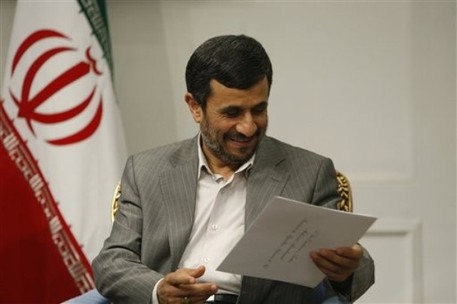
The more I think about it, the more it seems as though countries like Iran play and manipulate the United Nations like the southern Democrats manipulated the American Senate throughout the 20th Century. Here's yet another example:
Without fanfare, the United Nations this week elected Iran to its Commission on the Status of Women, handing a four-year seat on the influential human rights body to a theocratic state in which stoning is enshrined in law and lashings are required for women judged "immodest."
Buried 2,000 words deep in a U.N. press release distributed Wednesday on the filling of "vacancies in subsidiary bodies," was the stark announcement: Iran, along with representatives from 10 other nations, was "elected by acclamation," meaning that no open vote was requested or required by any member states — including the United States.
The primary offense here seems to be bureaucratic indifference, which is understandable, since this nomination appears to have been Iran's fallback option once the regime realized it wouldn't get on the equally dubious Human Rights Council.
The Obama administration never should've changed the Bush policy on that body, but I think the best response to this latest silliness is none at all.
(AP Photo)
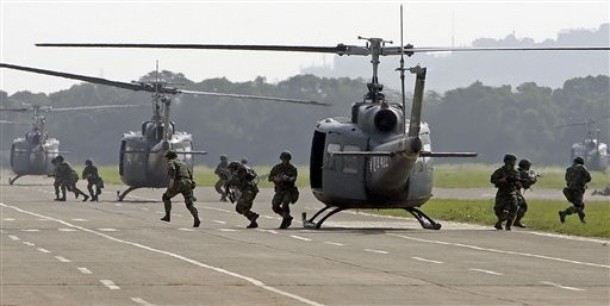
Dan Blumethal has a thorough post examining the implications of China's growing naval strength and what America's response should be:
Taiwan's importance is the same as the importance of our Japanese, South Korean, and Philippine allies -- more geopolitical than geostrategic. These countries have embraced the international system that the United States created and defended after World War II. They are democratic states with free market economies that all want to be part of what used to be called the "West," the worldwide club of modern, advanced industrial democracies. Washington's interests are better served when economically vibrant democracies are free from the control of other great powers - this better ensures that the international system remains hospitable to us.In my opinion, for geopolitical as well as geostrategic reasons, the United States military should maintain a (more defendable) presence on the territory of as many U.S. Asian allies as welcome it, at least until all can be assured that China will be a responsible and democratic great power, uninterested in creating its own exclusive economic or military spheres. That means we need to work harder to help our allies build capabilities that help frustrate China's military plans rather than pulling back and relying mostly on offshore bases.
To rephrase this, Blumenthal thinks we should engage in a massive Asian arms race until:
*China is "responsible"
*China is "democratic"
*China does not want "exclusive economic or military spheres"
Of all these conditions only one - a closed economic sphere - strikes me as something worth attempting to stop. I have no idea what being "responsible" means in this context but if it's a proxy for "doing what Washington says to do" then good luck with that. As for democratic, that's irrelevant. If China doesn't want to wage war on her neighbors or carve out exclusive economic zones in which we can't participate it, that should be enough for American policy.
As for a "military sphere" this is another way of saying that America must be the strongest military power in Asia (i.e. that it remains an "American sphere"). Such a strategy is plausible if we're counting the aggregate power of our allies and, crucially, we're not trying to sustain a similar posture everywhere else. Otherwise we're just going to accelerate our own bankruptcy and decline.
Finally, there is the idea that China will want to create a "closed" economic zone - precisely where and how this would occur and what material impact it would have on the U.S. isn't really specified, but isn't this rather important to spell out? It's been noted before but China is only growing powerful because it is participating in the open international economy (including trade with the U.S.).
Still, I think it's only proper to look 20 years down the road and hedge against the possibility that China, having grown strong off the system, would seek to fundamentally upend it. But it would be nice if advocates of a "preemptive containment" of China could state the case a bit more concretely.
(AP Photo)
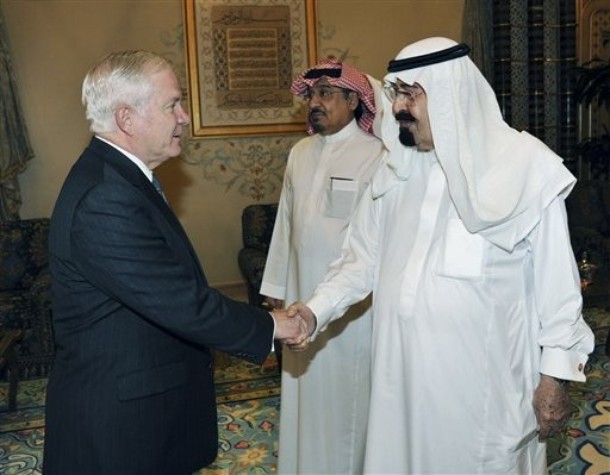
One of the very legitimate concerns about Iran acquiring nuclear capability is that it would spur other states in the region to acquire their own nuclear weapons as a deterrent. There's some reason to doubt this would happen - Israel fought actual wars with many Arab states and acquired a nuclear arsenal decades ago without causing a cascade of proliferation. But nevertheless non-proliferation experts think it's a very real possibility (and indeed some believe an arms race has more or less already begun).
But now Evelyn Gordon raises the opposite worry: that Arab states, including Saudi Arabia, will jump into Iran's orbit:
The prospect of a shift in Saudi Arabia’s allegiance ought to alarm even the Obama administration. Saudi Arabia is not only one of America’s main oil suppliers; it’s also the country Washington relies on to keep world oil markets stable — both by restraining fellow OPEC members from radical production cuts and by upping its own production to compensate for temporary shortfalls elsewhere.Granted, Riyadh is motivated partly by self-interest: unlike some of its OPEC colleagues, it understands that keeping oil prices too high for too long would do more to spur alternative-energy development than any amount of global-warming hysteria. And since its economy depends on oil exports, encouraging alternative energy is the last thing it wants to do.
Nevertheless, the fact remains that Saudi Arabia has been generally effective as stabilizer-in-chief of world oil markets and has no plausible replacement in this role. And since the U.S. economy remains highly oil-dependent, a Saudi shift into Iran’s camp would effectively put America’s economy at the mercy of the mullahs in Tehran.
So Iran would replace America's role as Saudi Arabia's close ally and use that position to... do what exactly, convince OPEC to raise the price of oil to $200 or $300 a barrel? It's possible that the Saudis could be that monumentally stupid as to put their entire economy (and monarchy) on a path to extinction, but even Gordon seems to doubt it.
Still, one could imagine a possible upside here. If Iran took the Saudi royal family under its wing, than perhaps bin Laden & co. would direct their fire at Tehran.
(AP Photo)
The Heritage Foundation recently hosted an interesting event on "The Dollar, The Euro, and the International Monetary Order" with, among others, Nobel Prize-winning economist Prof. Robert Mundell (described by Heritage as "the academic founder of supply side economics"). NRO's Sean Rushton gives a nice rundown of Mundell's quite impressive bio here:
For those not familiar with the Nobel Laureate, Mundell has been a guiding force behind major economic expansions since the early 1960s. His work as a young man likely influenced the Kennedy administration to ignore its Keynesian advisers in favor of tax cuts and sound money, leading to the robust expansion of 1961–68. Mundell correctly predicted the inflationary disease of the 1970s and advocated the supply-side policy mix that spurred two decades of non-inflationary expansion in the 1980s and ’90s. Mundell’s writing on optimum currency areas was the basis for the euro’s creation in 1999, erasing exchange-rate barriers across the world’s second largest economy. And Mundell has been an important adviser to China for two decades, guiding its economy out of Communist infancy to become the significant financial power it is today.The full video of the event is below, and Mundell's remarks start at about 1:15. For those of you who don't have the time to watch, Rushton also helpfully summarizes most of Mundell's comments (emphasis mine):
Mundell argues the recent crisis had three distinct parts.Part One was the real-estate bubble and subsequent bank-solvency crisis, which began in 2006. He says the bubble was generated primarily by the dollar’s fall after 2001, as U.S. monetary authorities made clear they wanted a lower dollar to improve exports. As the greenback dropped on foreign exchanges and against gold and other commodities, investors pursued the classic inflation hedge: They borrowed and bought hard assets, expecting to repay the debt with cheaper future dollars. Real estate, already roaring due to 1997’s expanded housing tax deduction, went into overdrive, goosed by subprime lending and mortgage securitization.
Part Two of Mundell’s analysis is the most intriguing and least understood aspect. He argues that, as the real-estate bubble burst, large quantities of fresh liquidity were demanded by the public and banks. In summer 2007, the world’s central banks supplied it and no liquidity crunch developed. But by summer 2008, spooked by rising inflation, the U.S. Federal Reserve failed to provide adequate cash, leading to dollar scarcity. Four key symptoms of tight money appeared within months: the dollar rose 30 percent against the euro; gold fell 30 percent; oil fell 80 percent; and the inflation rate dropped from 5.5 percent to negative levels. As a result, Mundell believes, Lehman Brothers collapsed, the stock market went into free fall, and a near-panic ensued. This phase was entirely preventable and constitutes one of the worst mistakes in Fed history, Mundell says. The crisis eased in early 2009, as the Fed upped the money supply, but the damage was done.
Part Three of Mundell’s analysis is the recession of 2008–09, with bailouts, rising unemployment, and skyrocketing deficits. He predicts decent growth this year, but believes unemployment will remain high and the recovery will be weak.
He says the U.S. must extend the Bush tax cuts and should also cut the corporation tax rate from 35 percent to 15 percent, to spur investment and recapitalize banks. Importantly, he says the U.S. should fix the dollar’s value against the yuan and the euro, thus creating an enormous common-currency area free of exchange-rate turbulence, which will prevent future debacles. It should be clear that Mundell sees a low and unstable dollar as culprit Number One in the crisis, and as the Bush administration’s biggest mistake.
The statements excerpted by Rushton above are also important, as they demonstrate Mundell's firm beliefs that (i) one of, if not the, biggest cause of the financial crisis was the significant US dollar devaluation undertaken by the Bush administration to improve American exports' global competitiveness; and (ii) the surest course to preventing future global meltdowns is pegging the US dollar, the Euro and the Chinese yuan (or RMB) and maintaining a strong, stable dollar.
So to summarize, Nobel Laureate, "father of supply-side economics," and presidential/Chinese economic adviser Robert Mundell is of the strong belief that (a) domestic price stability, not international export advantage, is China's primary reason for its historic RMB peg to the U.S. dollar; (b) pursuing an export-driven weak dollar policy was and will be disastrous for the U.S. economy; and (c) a fixed USD-RMB-EUR system would improve global trade and is the best way to prevent another collapse.
Now, I'm certainly not qualified to agree or disagree with Mundell's currency theories, but that's (once again) not my point. Instead, it's more important for me to just keep showing all of the serious and divergent ideas out there about global currency issues, particularly those from well-respected currency gurus showing very sound and sensible reasons for China's currency policies - ones that have nothing to do with conspiratorial allegations of predatory Chinese trade policies or breathless (and dangerous) demands that China appreciate the RMB. These "other" ideas deserve wide circulation because they are a vital counterweight to the current demagoguery out there in the U.S.-China currency debate. When guys like Mundell speak up, whether you agree with them or not, they further undermine the ridiculous certitude of American currency hawks like Paul Krugman and Sen. Chuck Schumer that China is intentionally manipulating its currency in order to prey on US industries and steal American jobs, and that some sort of dramatic RMB appreciation (and weaker US dollar) will magically solve the US and global economic crisis.
And the lesson, as always, is: when someone tells you with utter certainty that China is through its currency policies preying on the American worker, or that a stronger Chinese yuan and weaker US dollar will definitely improve the American economy, just stop listening.
This sounds about right:
Mervyn King, the governor of the Bank of England, has privately warned that whichever leader wins the election next week will be kicked out of power for decades because of the severity of budget cuts they will have to instigate, it was claimed today.As the leaders of the three main political parties prepare themselves for tonight's final, economy-themed TV debate in Birmingham, the warning ringing in their ears is that the job of Prime Minister could be a poisoned chalice.
Meanwhile, the Economist writes of the candidate's whistling past the financial graveyard:
In 2008, just before the fall of Lehman Brothers, Alistair Darling, the chancellor of the exchequer, let slip the prediction (controversial at the time) that Britain was in for the worst recession in sixty years. Two years, one semi-nationalised banking system and six quarters of painful contraction later, he has been proved right. The government deficit is 11.6% of GDP. Public debt is forecast to peak at £1.4 trillion (around 75% of GDP) in 2014-15 (a figure that ignores public-sector pension liabilities). Big spending cuts and tax rises will be needed to restore order to the public finances. Yet the looming age of austerity has figured only fitfully in a campaign that has so far been dominated by the unexpected rise of the Liberal Democrats.

Stephen Walt reads Aaron David Miller's essay on junking the peace process and asks a question similar to the one that I posed earlier in the week: if there's no peace process, how is Israel ultimately going to deal with the Palestinians? Walt, and indeed most peace process devotees, operate under the assumption that as there are increasingly more Palestinians under Israeli control it will be correspondingly more difficult for Israel to remain both Jewish and democratic and, crucially, that it will be correspondingly more difficult for the U.S. to support Israel under those conditions.
As Walt sees it, there are three possible scenarios:
So here's the question I'd really like Miller to address: if it becomes clear that "two states for two peoples" is no longer an option, what does he think U.S. policy should be? Should we then favor the ethnic cleansing of several million Palestinian Arabs from their ancestral homes, so that Israel can remain a democratic and Jewish state? (By the way, that would be a crime against humanity by any standard.) Or should we then press Israel to grant the Palestinians full political rights, consistent with America's own "melting-pot" traditions? (That is the end of the Zionist vision, and may be unworkable for other reasons). Or should we back (and subsidize) their confinement in a few disconnected enclaves (in Gaza, around Ramallah, and one or two other areas in the West Bank), with Israel controlling the borders, airspace, and water resources? (This is the apartheid solution, and it's where we are headed now.) I fear that some future president will have to choose between these three options, and it would be interesting to know what an experienced Middle East negotiator like Miller would advise him or her to do then.
I don't think that these are the only options available (and the framing of them puts all of the onus on Israel when there are other actors in this drama) but for the sake of argument let's assume Walt's got the bases covered. Why does he assume that any of these outcomes would provoke some kind of crisis in Israeli-U.S. relations or even present a problem for a future U.S. president and his/her foreign policy?
In any of the above scenarios, Israel will justify its behavior as being consistent with its core security interests. Israel's defenders will - quite rightly - argue that the U.S. supports regimes with far, far worse records when it comes to populations under their protection. If our support of Israel is paying real strategic dividends with respect to U.S. security, as some claim, then is it really a big deal how they treat the Palestinians?
In all of Walt's various scenarios, the people and NGOs who are concerned with the living conditions of the Palestinians will continue to call attention to their plight. And the people who currently don't care, or who believe that the Palestinians have brought it on themselves, or believe our support for Israel is mandated by God, or by our own security interests, will likely continue to put those considerations ahead of statehood for the Palestinians.
(AP Photo)
Hold on to your laptops, Hugo Chavez has given birth to his first tweet:

Loosely translated, it means,
How you doin'? Appeared as I said: at midnight. Headin' to Brazil. And very happy to work for Venezuela. We'll triumph!
Chavez's latest public relations effort is, according to his Minister of Public Works, Diosdado Cabello (whose name means God given hair), due to the opposition's active use of Twitter to protest and ridicule the Venezuelan president:
"The opposition thinks it owns the social networks. They think Twitter and Facebook are theirs. We are taking the battle to them, and we are 7 million militants that will take Twitter."
Of course, three months ago Chavez himself was declaring that
"using Twitter, the Internet (and) text messaging" to criticize or oppose his increasingly authoritarian regime "is terrorism."
Can't wait for the "seven million militants" to "take Twitter", now that Hugo's in.
Fausta Wertz blogs at Fausta's blog.
This one's a nightmare for anyone planning adequate and robust homeland security defenses - Reuters reports from Moscow that a Russian company is marketing a new cruise missile system which can be hidden inside a regular shipping container, potentially giving any merchant vessel the capability to wipe out an aircraft carrier.
The Club-K was put on the market at the Defense Services Asia exhibition in Malaysia for $15 million. At the exhibition, the marketing film showed the Club-K being activated from an ordinary truck and from an ordinary merchant vessel. The missiles, which have a range of 350 km (approx. 210 miles), are launched without further preparation and are targeting what looks like American ground and sea-based forces.
Defense analysts say that potential customers for the Club-K system include Iran and Venezuela – and, potentially, terrorist groups. Reuters quotes Robert Hewson of Jane’s Defense Weekly to say that “at a stroke, the Club-K gives a long-range precision strike capability to ordinary vehicles that can be moved to almost any place on earth without attracting attention. The idea that you can hide a missile system in a box and drive it around without anyone knowing is pretty new,” said Hewson, who is editor of Jane’s Air-Launched Weapons. “Nobody’s ever done that before.”
Hewson estimated the cost of the Club-K system, which packs four ground or sea-launched cruise missiles into a standard 40-foot shipping container, at $10-20 million.
“Unless sales are very tightly controlled, there is a danger that it could end up in the wrong hands,” he said.
Now with video:
Andrew Sullivan adds:
Now, with Labour in third place already, what will the millions of voters like Duffy do? Vote Tory? I'd like to think so. Maybe immigration will push her to Cameron. But Duffy's obvious belief in the classic Labour welfare state makes me suspect she could protest Labour by voting for the Liberal Democrats. Her initial response is that she won't vote at all - another disaster if replicated for Labour. If millions of Labour voters switch to the Lib-Dems, or stay at home in protest, we are talking about an electoral earthquake of historic proportions. This may be the sound that sets off the avalanche.
It should be interesting to see how this gaffe affects the daily tracking polls.
Yves Smith thinks so:
The real risk here is to Eurobanks. They ran with even higher leverage ratios than US banks, they are believed to have recognized less of the losses thus far on their books than their US peers. Even worse, readers report that the major dealers (and the Eurobanks were part of this cohort) are carrying toxic assets at prices that are vastly above likely long-term value. Eurobank exposure to Greece is over $190 billion, and total periphery country exposure is roughly $900 billion.In the subprime crisis, many pundits and the Fed itself thought the losses would be contained, unaware that for every $1 in BBB subprime bonds, another $10 in CDS had been written, and that many of these exposures sat with highly levered firms, namely insurers and dealers, who were not able to take much in the way of losses. The gross level of exposures looks much worse here and the banks most at risk have not done much (save take government handouts) to rebuild their balance sheets.
So the whole idea that the financial crisis was over is being called into doubt. Recall that the Great Depression nadir was the sovereign debt default phase. And the EU’s erratic responses (obvious hesitancy followed by finesses rather than decisive responses) is going to prove even more detrimental as the Club Med crisis grinds on.
Meanwhile, today is the third and final UK debate. Iain Martin thinks the collapsing Euro could boost Cameron:
But Mr. Cameron has just been dealt a potential ace by the markets. It will be interesting to see if he realizes this and works out a way of playing it in a manner that voters understand.The worsening crisis in the euro zone has attracted very little attention in the general election, thus far. After all, the U.K. isn't a member.
However, the growing crisis is at root about large debts and the markets demanding that states start taking serious action. When Mr. Brown says that there is no imperative to makes cuts, Mr. Cameron can point to what is going on in the euro zone and say with some force that here is a clear warning from next door. Britain isn't yet in line for the ire of investors; it might be sooner than one thinks if action isn't taken this day.
Meanwhile, Mr. Clegg wants to join the euro—putting him in an interesting position Thursday night.

Danielle Pletka, writing - as usual - about freedomy stuff, bemoans the president's failure to take North Korea seriously . . . or something:
This is North Korea Freedom Week (being commemorated in Seoul, Republic of Korea), though it would be hard to tell in the capital of the freedom-loving world. North Korea appears to have slipped entirely off the radar of the Obama administration; neither the plight of its downtrodden citizens nor the proliferation of its nuclear weapons technology and missiles has stirred the interest of an administration purportedly obsessed with nonproliferation.
North Korea has long had its own people, as well as our allies in Japan and South Korea, in its gun sights. With Iran’s help, our allies in the Middle East and, with time, Europe and the United States, will join that unlucky group.
I really don't want to devote too much time to this, as we already know to take Ms. Pletka's web musings with a grain of salt. So I'll simply ask: What more should President Obama be doing about North Korean oppression and proliferation?
Last year, Pyongyang threatened to test a long-range missile in the direction of Hawaii and the administration quickly moved to fortify Hawaii. Of course, North Korea's track record for testing long-range missiles has been mixed at best, so just how serious these temper tantrums should be taken is debatable.
The ability to use these weapons of course matters, but, like in the case of Iran, such details are a tangential nuisance to Pletka and other neoconservative think tankers. Obama made the necessary maneuverings to defend the country, while quietly deferring to South Korean leadership on nuclear proliferation on the peninsula. South Korean President Lee Myung-bak has taken a hard line with the North, one President Obama agrees with. This policy makes sense, as it's in South Korea's more immediate interest - as well as the entire region's - to engage and, if necessary, contain the North.
Pyongyang uses America's presence in the region as justification for its nuclear adventurism; the louder and larger the role played in the region by the U.S., the smaller and less relevant the other actors become. The Obama administration, opting to break this pattern, has stepped back and handed the leadership reins to regional actors in an effort to change the Washington-Pyongyang dynamic. (Dear Leader has apparently taken notice of this shift, and may be rattling the saber a bit louder in order to draw Washington back in.)
So I ask again: With security measures in place, nuclear know-how controls underway and South Korea in the lead, what then should the Obama administration do about North Korea?
UPDATE:
Bruce Klinger of the Heritage Foundation makes a good point, and explains why South Korean leadership - and American compliance - is even more important now in light of the Cheonan sinking:
South Korea will contemplate both unilateral actions, including punitive economic and diplomatic measures, as well as taking the issue to the UN Security Council for multilateral response. In the latter case, Seoul would face stiff opposition from China and Russia, which have obstructed previous attempts to punish Pyongyang for violating UN resolutions.If South Korea is reluctant to attack, it would be impossible for the US to be “more Korean than the Koreans” by advocating stronger measures. But the Obama administration should consult closely with the South Koreans and support whatever action they are comfortable taking. This should include pressing the Chinese and Russians to relent in favor of tougher international sanctions, and taking unilateral punitive action that complements the South Korean approach.
(AP Photo)
This probably wont' help Mr. Brown's poll standing:
The Prime Minister was heard describing an exchange he had with a female voter on the campaign trail today as a "disaster", calling her a "bigoted woman".The comments were made as he got into his car after speaking to the woman in Rochdale, not realising that he had a Sky News microphone pinned to his shirt.
He told an aide: "That was a disaster - they should never have put me with that woman. Whose idea was that? It's just ridiculous..."
Asked what she had said, he replied: "Everything, she was just a bigoted woman."
The voter, 65 year old Gillian Duffy, had pressed the prime minister on immigration and other matters.
UPDATE: Audio here.
The Washington Post reports on post-election Iraqi politics:
Sunnis, who won meager representation in the 2005 parliamentary election, voted in droves this year, contributing to Iraqiya's narrow lead. Prime Minister Nouri al-Maliki's slate won two fewer seats, but could conceivably come up on top as a result of the manual recount of 2.4 million votes in Baghdad and the disqualification of elected Iraqiya candidates.That would almost certainly spark widespread anger in Sunni communities, where many view Maliki as a sectarian, and an increasingly authoritarian statesman.
The prime minister and other Shiite leaders have called the recent challenges to the election results lawful processes that must run their course. Allawi said Wednesday's statement would be Iraqiya's final appeal for fairness. He ominously warned that the party would henceforth "revert to the Iraqi people to implement their will."
Adding to the political tension, Human Rights Watch released a report late Tuesday saying that members of a military unit under Maliki's command systemically tortured and sexually abused hundreds of Sunni Arab prisoners.
The report, drawn from interviews this week with 42 men who were formally held at the Muthana Airport military base, says guards beat, shocked and sodomized inmates in an effort to get them to confess to crimes.
Part of me thinks that we've entered into a period similar to 2004-2005, where brewing trouble inside Iraq is either dismissed or ignored. Just as conservatives and the Bush administration pooh-poohed the insurgency right up until the point that it exploded, now (if they're even paying attention) they're dismissing the political violence and declaring President Bush a world-historical figure for the Surge. Liberals, who had an incentive during the Bush years to sound the alarm, have mostly fallen silent (except for Robert Dreyfuss, who thinks Iran has already won). I sure hope I'm wrong. But sectarian torture camps don't bode well for the future of a democratic Iraq.
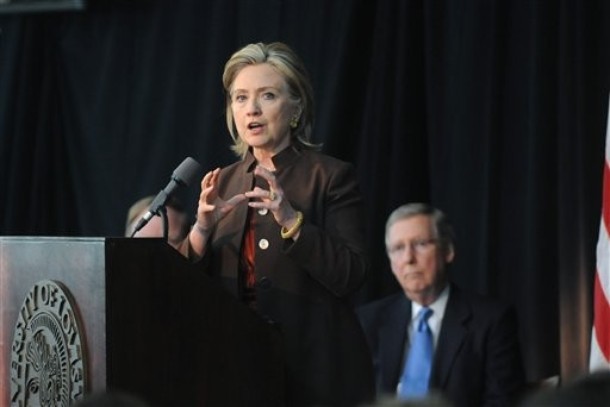
There's a debate swirling in wonkish circles about the status of U.S. missile defenses under the New START arms control treaty between the U.S. and Russia. Critics of the deal say the Obama administration had to neuter our missile defense plans to get an agreement, while supporters of the deal say no such snipping occurred.
Dimitri Simes, writing in Time, said the Obama administration did indeed give up the store to get the arms deal signed:
Russian experts and officials... believe that America made a tacit commitment not to develop an extended strategic missile defense. As a senior Russian official said to me, "I can't quote you unequivocal language from President Obama or Secretary Clinton in conversations with us that there would be no strategic missile defenses in Europe, but everything that was said to us amounts to this." In this official's account, the full spectrum of U.S. officials from the President to working-level negotiators clearly conveyed that the reason they rejected more explicit restrictions on missile defense was not because of U.S. plans, but because of fear that such a deal could not win Senate ratification. A senior U.S. official intimately familiar with the talks has confirmed that the Russians were advised not to press further on missile defenses because the Administration had no intention to proceed with anything that would truly concern Moscow.
Arms control expert Jeffrey Lewis reads the treaty and offers his take:
I think it is very hard to conclude that the treaty “limits” missile defenses. The treaty may have some implications for missile defense programs, but on the whole it is written in such a way as to create space for current and planned missile defense programs, including language that exempts interceptors from the definition of an ICBM and the provision to “grandfather” the converted silos at Vandenberg.
I can't parse the nuances of arms control arcana, but Simes' account of the negotiations recalls the ambiguity of supposed U.S. promises* to Russia regarding NATO expansion at the end of the Cold War. That's been a persistent sore point in U.S.-Russian ties. Will this become another?
*Mark Kramer has a definitive rebuttal of Russian claims that they were promised anything with respect to NATO expansion.
(AP Photo)
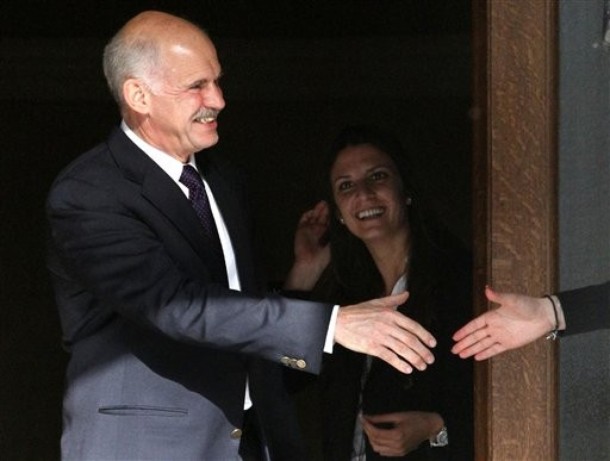
Felix Samon passes along some informed speculation as to what will happen if Germany (as expected) refuses to bail out Greece. In a word, default:
Where would Greek debt trade in the event of a default? This is the scariest thing: my highly plugged-in companions both agreed that it wouldn’t just fall to 70 or even 60 cents on the dollar: they saw fair value closer to 40, and said that it would probably fall to 30 before people started buying.Needless to say, if Greek debt was trading at 30 cents on the dollar, it wouldn’t take long for the Portuguese domino to topple. After that, Spain — and then, it’s easy to imagine, Italy, Ireland, UK. And so the stakes are very high: it’s certainly cheaper to bail out Greece with virtually unlimited funds than it is to risk a fully-blown PIIGS default. But there does seem to be the hope or expectation that a line could get drawn in the Iberian sand, and that Italy and Ireland would not be allowed to default even if Portugal and/or Spain imploded.
Meanwhile, Walter Russell Mead urges us not to gloat over Europe's implosion. Sage advice. America may enjoy a short term boost as investors flee Europe, but we still need to get our own fiscal house in order.
(AP Photo)
Angus Reid has found an interesting divergence:
People in three countries hold differing views on climate change, according to a poll by Angus Reid Public Opinion. 58 per cent of respondents in Canada believe global warming is a fact and is mostly caused by emissions from vehicles and industrial facilities, but only 41 per cent of Americans and 38 per cent of Britons concur.
Moreover, more British believe that climate change is a theory that hasn't been proven yet than Americans.
I'm surprised by the UK findings given that the three leading candidates for Prime Minister have all sought to emphasis their green bona fides. Complete poll here (pdf).
The fundamental incongruity in the administration's approach is that they are banking on this Iranian government to save us from having to do the unpleasant and unpopular work of making the world a safer place. - Kori Schake
Here's another incongruity to ponder - why would making the "world" safe from Iran make the United States unpopular? Seems like a surefire winner to me.
And why - if we are indeed acting on behalf of "the world" - do large swathes of it not share our concern or embrace our preferred policy response? Could it be that stopping Iran's nuclear program is actually a more parochial interest?
This story is perfect for Hollywood - or better yet, Bollywood - screenwriters: a high-ranking Indian Commodore is embroiled in a Russian honeypot scheme that has created quite a stir in both countries.
According to British newspaper The Daily Telegraph, an Indian Commodore (First Rank Captain), tempted by a Russian woman translator in Severodvinsk, is suspected of inflating the price of the aircraft carrier "Admiral Gorshkov," which India bought from Russia. Commodore Suhdzhinder Singh led one of the Indian delegations that monitored the repair work on heavy aircraft carrier "Gorshkov" in the northern Russian city of Severodvinsk in 2005-2007. It was then that he met with an attractive blonde interpreter Masha.
"They met so closely that their photos are now studied very closely at the Ministry of Defence of India," writes Komsomolskaya Pravda. It is not known how these photos came into the hands of the Indian military, but there is now an official investigation against the Commodore.

The Daily Telegraph writes that the Indian officer was so influenced by his Russian girlfriend, that he "overestimated" the value of the work on the aircraft carrier. The original contract of purchase for "Admiral Gorshkov" was around $1 billion, but in the end, after much bilateral arguments with Russian counterparts, New Delhi agreed to pay almost $2.3 billion. The paper put the blame for this debacle on the Russian intelligence.
Commodore Singh, one of the leaders of the aircraft repair and refurbishment monitoring team, arrived in Russia in early October 2004. Specialty Engineer by profession, with 25 years of immaculate service in the Navy, married with two children - he exemplified an "ideal officer" in his country.
He lived away from his family for six months - his wife and kids remained in India. "Logically, local Russian beauties turned their attention to the dashing Indian officer," writes Komsomolskaya Pravda. "The women of Severodvinsk dubbed foreign guest "Captain Nemo," who was often seen in local cafes and bars."
"He was very friendly," say frequenters of local hot spots. "And he enjoyed special attention amongst women. He went everywhere in his turban, which was seen as very exotic."
In December 2004, the first Indian monitoring team led by Singh met with local officials. When officials asked his team on their quality of life in Severodvinsk, Singh answered honestly: "Since we will live here for a while, we would like to integrate into this society, and be part of the local population." Russian officials then offered assistance in solving this problem.
Perhaps it was during this time the commodore was introduced to the beautiful blonde, who played such a fatal role in his career. Still, none of the inhabitants of Severodvinsk can identify the girl in the scandalous photo - they say "what a nice Masha, but is certainly not one of ours ..."
Israeli Deputy Minister of Foreign Affairs Daniel Ayalon will be answering questions about U.S.-Israeli relations and the future of the peace process in a Foreign Affairs web-event. RealClearWorld readers can submit a question for consideration by emailing it to us with "FA Question" in the subject line. We'll select the best and send them to Foreign Affairs.
Newsweek interviews Norway's Prime Minister Jens Stoltenberg on how the country weathered the Great Recession with an unemployment rate of 3.3 percent. The secret to the country's success is, obviously, its huge oil and gas reserves in the North Sea. But the country has plowed the profits from its oil sales into a sovereign wealth fund worth $450 billion. Says Stoltenberg:
We have the most transparent and most predictable investment fund in the world. The reason we have this sovereign fund is we have saved most of the oil revenues rather than spend them on tax cuts. Our value-added tax is 25 percent and gasoline price is $8 per gallon. The whole idea is to replace our national wealth from oil and gas in the ground to equity and bonds in the international market. It has been important for the Norwegian government to avoid Dutch disease by not spending too much.
Could U.S. leaders be similarly responsible? I somehow doubt it.
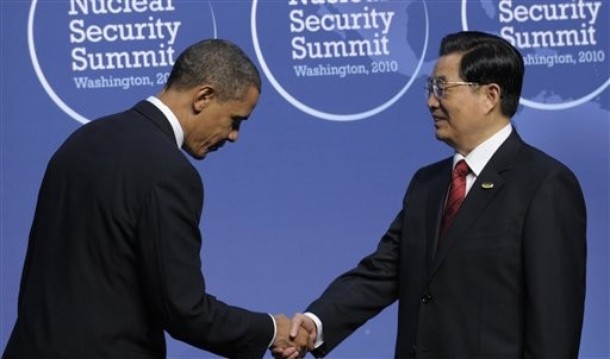
There have been a spat of stories detailing the growing power and assertiveness of China's navy and the natural question of whether this portends a kind of great power clash with the U.S. in the not-so-distant future.
Abe Denmark writes in Wired about the modernization and "aggression" of the Chinese navy in the South China Sea. At the Federation of American Scientists' blog, Hans M. Kristensen discovers a new Chinese naval demagnetization facility for its submarine fleet, proof of the country's growing capability. Meanwhile, Stephen Walt draws a comparison between China's increasing regional assertive and the Monroe Doctrine. As a growing China pursues the natural course for a budding great power in expanding its influence, Walt argues, security competition with the U.S. is inevitable.
I'd say that sounds right, but Hugh de Santis reminds us that China's neighborhood is far less accommodating to a great power rise than the Western Hemisphere was to the U.S.:
Although China’s neighbors have prospered from its economic rise, they are having second thoughts about its intentions. As Asian production networks become more integrated, members of ASEAN (the Association of Southeast Asian Nations) that warmed to the idea of the China-ASEAN Free Trade Agreement when it was proposed in 2001 are beginning to worry that they will be reduced to economic appendages of Beijing.This is especially true of Thailand and Malaysia, whose exports must compete with similar and often cheaper goods from China. But even countries rich in commodities that China covets are voicing concerns, including those in mainland Southeast Asia. Chinese plans to mine bauxite in Vietnam have provoked considerable domestic criticism. Cambodia too is wary that Beijing will eventually acquire their land and water rights. Though it relies on China for money and arms, the military junta in Burma is also hedging its bets by increasing contacts with India and the United States. And Indonesia, a major beneficiary of Beijing’s ravenous demand for raw materials, has gone so far as to delay implementation of the FTA because it fears that it may put pay to its steel and textile industries.
More than its economic penetration of the region, it is China’s growing self-confidence and muscle-flexing that has aroused fears in its neighbors that its ultimate objective may be hegemony rather than harmony.
I ultimately think China's neighborhood will act as the best check on any "hegemonic" ambitions the country might harbor.
(AP Photo)
A poll in the Israeli paper Yisrael Hayom provides further evidence of the ill will between the Obama administration and Israeli public. The key findings:
What do you think of the American demand to freeze construction in Jerusalem? Support 21.8% Oppose 71.6% Don’t know/refuse reply 6.6%Who is responsible for the tension between the USA and Israel – Obama or Netanyahu?
Obama 58.6% Netanyahu 16.2% Both 17.6% Don’t know/refuse reply 7.6%Is Obama interested in improving relations with the Arab states at the expense of Israel?
Yes 60.9% No 26.5% Don’t know/refuse reply 12.6%
According to Laura Rozen, the administration is knee deep into a charm offensive directed at Israeli leaders. [Hat tip: Commentary]
Airspace Rebooted from ItoWorld on Vimeo.
This video visualizes European air travel during and after the giant ash cloud. Very neat. [Via Passport]
In international institutions, China scored big diplomatic points this weekend.
Interestingly enough, while this is ostensibly a move motivated by economics, Robert Zoellick uses words more closely associated with power politics, like "polarity," than with political economy.
For more videos on topics from around the world, check out the Real Clear World videos page.
Nile Gardiner compiles a list of the Obama administration's "top ten insults to Israel." Your mileage may vary here but Number 2 struck me as a bit curious:
In contrast to its very public humiliation of close ally Israel, the Obama administration has gone out of its way to establish a better relationship with the genocidal regime of Mahmoud Ahmadinejad, which continues to threaten Israel’s very existence. It has taken almost every opportunity to appease Tehran since it came to office, and has been extremely slow to respond to massive human rights violations by the Iranian regime, including the beating, rape and murder of pro-democracy protesters
Indeed. Because when I want to establish good relations with a country, I push for a global effort to cripple its economy, call it a "military dictatorship" and attempt to isolate it politically.
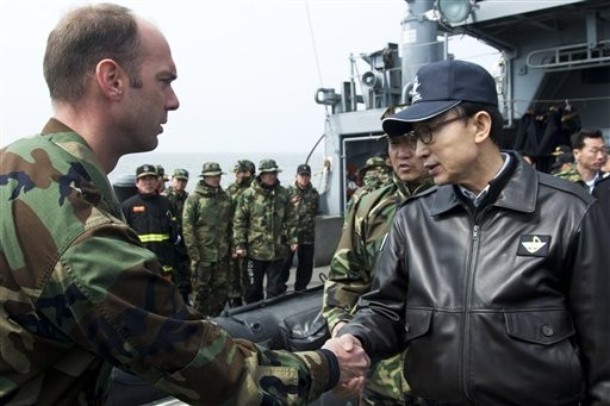
While Japan's Prime Minister is reeling from a bruising battle with the U.S., Sheila Smith argues that South Korea's President is ascendant:
The skilled President Lee Myung-bak seems to have catapulted his country into a top spot on the U.S. favorite partner list. Despite the deeply difficult domestic politics that confront the South Korean President regarding the undone KORUS trade agreement, he has positioned himself well on virtually every issue that President Obama cares about. Last fall, when Afghanistan’s stability was the top item on Obama’s agenda, President Lee promised to send a South Korean PRT there to contribute. When Obama visited Asia, Lee poured on the personal charm coupled with some very strategic thinking in his intimate conversation with Obama on the problem-solving opportunities ahead.
(AP Photo)
Washington, DC readers should be sure to check out an event this Wednesday at the Carnegie Endowment for International Peace on political reconciliation in Afghanistan. Gilles Dorronsoro, a visiting scholar at the Endowment who just returned from the country, will be discussing his trip and the likelihood of a unity government in Kabul.
Interested readers may register to attend Wednesday's event here.
The latest RCP average puts David Cameron's Conservative Party up 4.5 points, giving the Tory leader a week-long window to create some breathing room between the surging Nick Clegg and himself.
Be sure to check the RCP Average daily, and get more opinion and analysis on the British elections from our United Kingdom homepage.
UPDATE: Nate Silver has a thoughtful and thorough analysis on possible parliamentary seat allocations.
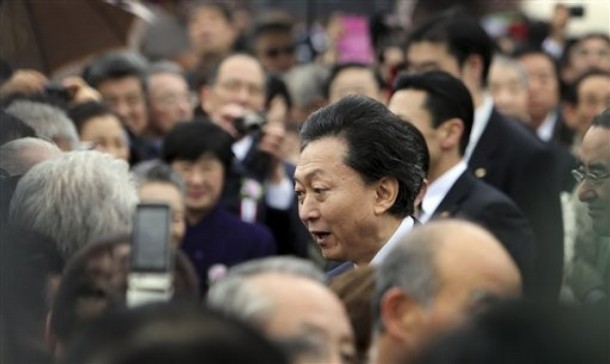
Two out of three Japanese voters disapprove of Prime Minister Yukio Hatoyama and nearly 60 percent think he should resign if he fails to resolve a feud over a U.S. airbase by an end of May deadline, a media poll showed on Monday....The Nikkei newspaper poll, conducted over the weekend, showed 68 percent of voters disapprove of Hatoyama, up 11 percentage points from the previous poll last month, partly on frustrations over the Futenma U.S. base row.
On Sunday, 90,000 people turned up at a rally against the U.S. base.
(AP Photo)

Nicholas Sarkozy is expected to introduce a bill on Monday that would ban the wearing of full veils in public. A new poll shows the French support some restrictions on the Burqa in public:
Two-thirds of French people want a law limiting the use of face-covering Islamic veils such as the niqab and the burqa, with only a minority backing the government's plan for a complete ban, a poll showed Saturday....The TNS Sofres/Logica poll, which was carried out on Thursday and Friday, showed that 33 percent of French people want a complete ban, while a further 31 percent want a more narrow law applying only to certain public spaces.
The results of the survey of 950 people were roughly the same for men and women. Support for some kind of legal restriction on the full veil cut across age groups, professions and political affiliation, though it was stronger among right-wing voters -- more than 80 percent of them favored a law.
(AP Photo)
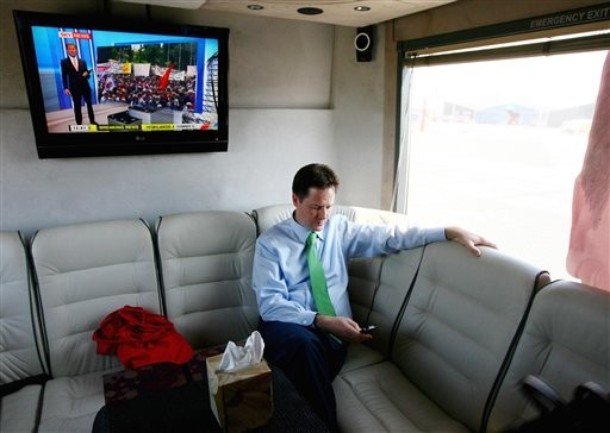
Max Bergmann thinks UK candidate Nick Clegg is right to urge the cancellation of the Trident nuclear program. I'm not well versed in the particulars of the Trident debate, but on the broader issue of whether Britain should retain a viable nuclear deterrent, I don't find Bergmann's argument all that persuasive. He writes:
The notion that the UK needs nuclear weapons because of the dangers of Iran demonstrates an outdated world view that sees Britain as isolated and sees security issues in a vacuum. The fact is that the UK is in NATO – which means under Article 5 an attack on one NATO member is an attack on all. This means that an attack on the UK is an attack on the US and therefore the US nuclear deterrent is effectively a UK nuclear deterrent as well. If the UK’s nukes just magically disappeared there would be no practical change in its ability to deter a nuclear attack.The debate over the Trident is therefore at its heart is not about questions of security but about nuclear weapons as a sign of global prestige and clout. The fact is that the role of nuclear weapons has significantly declined following the end of the Cold War, since, as Colin Powell noted, nuclear weapons are militarily “useless.” Clegg is therefore right when he states in defense of eliminating the Trident that “the world is changing, when we’re facing new threats.”
But a Britain that is willing to spend more than $100 billion dollars on a nuclear weapons program that has little real military utility, is not just swimming against the global tide, but is sending an incredibly regressive signal to the world over the importance of these weapons.
So the British should rely on America's nuclear deterrent when the U.S. is supposedly on its own quest to abolish nuclear weapons and limit the role they play in its own deterrent posture. But if NATO is to have a credible nuclear deterrent someone has to have nuclear weapons. If the U.S. under the Obama administration is intent on scaling back and eventually eliminating its own arsenal, it seems a prudent hedge on Britain's part to retain theirs (in what form and how much they should spend on it is a debate for another day)
Britain enjoys collective security today. And while it's reasonable to conclude that they will continue to do so far into the future, predictions are hard, especially about the future. A country ultimately needs to rely on itself for its own security and in this regard, nuclear weapons are not just fashionable, they are vital. And irrespective of any signaling, the truth is nuclear weapons are important. Why else would we be working so hard to make sure no one else can have them?
(AP Photo)
I have to say, I find the effort to rebrand George W. Bush as Woodrow Wilson II rather amusing. Here's Bari Weiss writing in the Wall Street Journal:
Mr. Bush is almost certainly aware that the freedom agenda, the centerpiece of his presidency, has become indelibly linked to the war in Iraq and to regime change by force. Too bad. The peaceful promotion of human rights and democracy—in part by supporting the individuals risking their lives for liberty—are consonant with America's most basic values. Standing up for them should not be a partisan issue.Yet for now Mr. Bush is simply not the right poster boy: He can't successfully rebrand and depoliticize the freedom agenda. So perhaps he hopes that by sitting back he can let Americans who remain wary of publicly embracing this cause become comfortable with it again. For the sake of the courageous democrats in countries like Iran, Cuba, North Korea, Venezuela, Colombia, China and Russia, let's hope so.
For the sake of argument, let's grant Weiss' argument that promoting freedom was the "centerpiece" of President Bush's foreign policy agenda. How'd he do? Well, according to Freedom House, global freedom decreased in each of the last three years of his tenure, continuing through the first year of Obama's tenure.
I happen to think it's foolish to assign blame or credit for the ebb and flow of global freedom to the actions of a single politician or a single cohort of bureaucrats in Washington. But that's the terrain that Weiss has chosen to fight on, and by that measure, the freedom agenda was not successful (at least according to Freedom House's rankings).
Rod Liddle shows you how it's done:
The elevation of Clegg, you would hope, marks the apogee of the cretinisation of the British electorate, in which the public debate is now pitched at a slightly lower level than that implied in the sorts of questions I used to be asked by my two sons: ‘Dad, what would win in a fight between a tiger and a shark? What would win in a fight between a table and a desk?’ It cannot surely drop lower than this, can it? Clegg’s sole pitch, the only thing which scored him points — ‘at least I’m not them’ — was, nonetheless both accurate and had force. It would have had no less force if it had been issued by a gently cooling bowl of oxtail soup on a plinth, either, and would undoubtedly have contained more substance.
Once again, the Obama administration is trampling over the wishes of its allies in an effort to appease America's enemies:
Fresh from signing a strategic nuclear arms agreement with Russia, the United States is parrying a push by several NATO allies to withdraw its aging stockpile of tactical nuclear weapons from Europe.Speaking Thursday at a meeting of NATO foreign ministers here, Secretary of State Hillary Rodham Clinton said the Obama administration was not opposed to cuts in these battlefield weapons, mostly bombs and short-range missiles locked in underground vaults on air bases in five NATO countries.
But Mrs. Clinton ruled out removing these weapons unless Russia agreed to cuts in its arsenal, which is at least 10 times the size of the American one. And she also appeared to make reductions in the American stockpile contingent on Russia’s being more transparent about its weapons and willing to move them away from the borders of NATO countries.
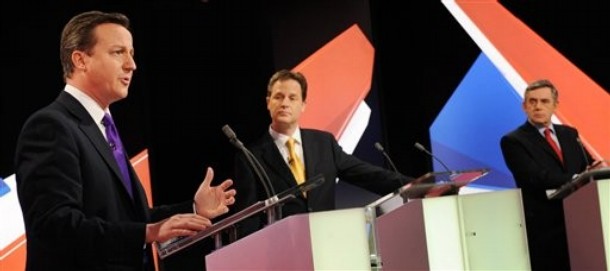
Watching the second UK debate yesterday, I was struck by how narrow the focus on foreign policy really was. China was only mentioned twice and as an aside to the climate change debate. Russia, once, in passing. Iraq, three times, and again as an aside. No mention of India, Asia, Israel, Palestine or the Middle East. (Incidentally, the BBC has an amazing tool where you can search the debate for key phrases.)
I think we have a very unfortunate tendency in the U.S. to expect political leaders to "solve" global problems. But watching the British debate there was very little sense, outside of the climate change and terrorism discussions, that events and geopolitical trends beyond their borders had any urgent meaning.
(AP Photo)
Howard L. Berman (D-CA), chairman of the House Foreign Affairs Committee, issued the following statement yesterday on Iranian sanctions:
“Iran’s intentions are clear, and now is the time to implement crippling sanctions on this reckless regime.“Iran’s claim that it is pursuing only civilian nuclear production falls flat under the weight of deceptions, unexplained activities, and credible documentation. The International Atomic Energy Agency just recently expressed its grave concerns over Iran’s activities noting ‘the possible existence in Iran of past or current undisclosed activities related to the development of a nuclear payload for a missile.’
“During President Obama’s Nuclear Security Summit the international community demonstrated it would not tolerate nuclear weapons in the hands of irresponsible actors. We are moving forward to ensure that legislation enabling tough sanctions is on President Obama’s desk for his signature.”
Meanwhile, Berman is moving forward with Iran sanctions reconciliation.

Alex Massie, who gives Gordon Brown the win in yesterday's debate, dissects Nick Clegg's performance:
As for Clegg, he was solid but not spectacular. There were moments of hesitancy and some rambling but in general I found his manner appealing: he gave the impression of listening to the questions and then thinking about his answers and did more to engage the audience - both in Bristol and at home - than either of the other candidates. He was brave on immigration too and his final line - for those still watching - was excellent: “Don’t let anyone tell you it can’t be different. It can.”
This, minus the rambling, is why I give Clegg the win in debate #2. He seemed to speak more directly to the various audiences, and he got his change and choice message across rather well - getting your message across trumps 'winning' and 'losing' in the traditional debate sense. Televised political debates aren't normal debates.
I thought he got caught up in an eye rolling moment, a la Al Gore in 2000, while pressing Cameron and Brown on immigration, but I think he also had the luxury of getting a little cattier, more direct in this debate, as viewership - like here in the United States - dropped significantly from the first one.
Did you miss yesterday's debate? Well you can watch the opening statements here until we get the full debate video up, and also be sure to check the RCP average every day for the latest poll numbers on the British race.
UPDATE: And this is an awesome debate recap tool.
(AP Photo)
Earlier in the week I wondered if Obama was truly out-of-step with public sentiment in his approach to Israel. I was skeptical, but now CNN reports on a poll that directly addresses the question:
Only a third of Americans approve of the way President Obama's handling the conflict between Israel and the Palestinians, according to a new national poll.A Quinnipiac University survey released Thursday morning indicates that 35 percent of the public gives the president a thumbs up on how he's dealing with the situation between Israel and the Palestinians, with 44 percent saying they disapprove, and just over one in five unsure.
This stands in contrast with how Americans feel about Obama's overall handling of foreign policy, with 48 percent approving and 42 percent saying they disapprove.
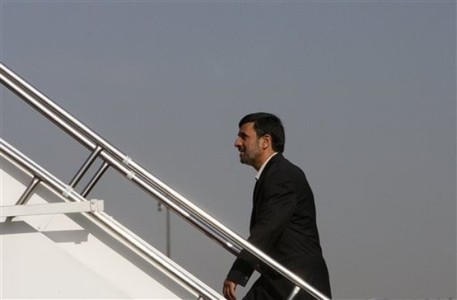
Ezzedine Choukri Fishere argues for full nuclear disclosure in the Middle East:
First, it would lay to rest the complaints about double standards in the nonproliferation community and relieve the US - and Israel - from the untenable claim that Israel's nuclear arsenal should somehow be treated as exceptional (a claim that nobody outside Washington and Tel Aviv gives serious consideration). The double-standard argument has been the most successful weapon against nonproliferation, especially in mobilizing public support for nuclear projects like those of Saddam's Iraq, Ghaddafi's Libya or Iran (and you will hear a lot about it in the coming weeks leading up to the NPT review). Second, such a dialogue would significantly decrease the pressure on Arab governments to start their own nuclear programs and abort what could be the beginning of a nuclear race in the region. Third, this dialogue would pave the way for the establishment of a Middle East security regime, which could be the vehicle for addressing a wide range of security hazards in this troubled and troubling region. Finally, such a dialogue might offer a framework for addressing Iran's problematic nuclear activities, especially if accompanied by a package of stabilizing confidence-building measures.
The problem here isn't the substance, but the messenger. As Colum Lynch recently pointed out, Washington's sudden insistence that the world disarm and turn back the nuclear doomsday clock rings rather hollow to weaker nations mulling the nuclear weapons route. Once again - much like with the global emissions debate - the United States, having already developed, proliferated and polluted, is telling the rest of the world what's best. There are obviously finer points and nuances to this perception but, generally speaking, it comes across as more unilateral lecturing from the West.
This of course complicates Obama's rapprochement strategy with Iran. Nonproliferation is important, perhaps too important to rest entirely on the unpredictable - and often erratic - actions of the Iranian regime. And thus far, the case against Iran has been an internationalist and legalistic one; filled with violated protocols, perfunctory deadlines and deliberative hectoring. The president intended to engage - instead he audits.
And I get the idea: Halt Iran's nuclear intransigence, buy time on the so-called doomsday clock and create the necessary breathing room to discuss the litany of other issues in need of resolving. But Obama has instead given the Iranians an opening to make this a global 'north' vs. 'south' argument, which hurts your case when you need countries like Brazil, China and Russia to support an engage/sanction Iran strategy. Rather than providing breathing room, the nuclear debate has instead sucked all the oxygen out of the room.
It's a strategy, to be fair, that I supported - and continue to, albeit tentatively. And perhaps there's still a chance for a fuel swap deal, but I remain skeptical.
(AP Photo)
A new poll conducted by Public Agenda has found the American public less anxious about foreign policy than it's been in four years:
The Foreign Policy Anxiety Indicator stands at 122, a 10-point drop since 2008 and the lowest level since Public Agenda introduced this measure in 2006. The Confidence in Foreign Policy Index, produced by Public Agenda in collaboration with Foreign Affairs, uses a set of tracking questions to measure Americans' comfort level with the nation's foreign policy, much the same way the Consumer Confidence Index measures the public's satisfaction with the economy.The Anxiety Indicator is measured on a 200-point scale, with 100 serving as a neutral midpoint, neither anxious nor confident. A score of 50 or below would indicate a period of complacency. Above the "redline" of 150 would be anxiety shading into real fear and a withdrawal of public confidence in U.S. policy.
Digging into the numbers, the survey found a partisan divide with Republicans evincing more anxiety about our foreign policy than either Democrats or Independents. Despite the overall mood of relative calm, Public Agenda found that most Americans still see the world as a dangerous place. "The number who say the world is becoming 'more dangerous for the United States and the American people' is virtually the same was it was two years ago: 72 percent, compared with 73 percent in 2008," the survey noted.
Despite America's improved image internationally, 50 percent of those surveyed by Public Agenda said U.S. relations with the rest of the world were on the "wrong track." Only 39 percent said they were on the right track.
Americans were also polled on Afghanistan. Forty eight percent said that our safety from terrorism did not depend on our success there vs. 40 percent who believed it did.

Today, Britain's three leading contenders for Prime Minister will square off for their second televised debate. This time, the focus will be on foreign policy. As a primer, you can view the relevant portions of their manifestos here (for Cameron) here (for Brown) and here (for Clegg).
The debate is expected to center on immigration, Britain's nuclear deterrent and the war in Afghanistan. To set the stage, The Independent has a new poll out assessing the war effort:
The vast majority of voters are hostile to the war in Afghanistan and believe the political parties are failing to give voice to their opposition, a new poll has discovered ahead of the televised leaders' debate on foreign affairs tomorrow.The ComRes survey for The Independent and ITV News finds that nearly three-quarters of electors view the conflict as "unwinnable" and more than half say they do not understand why British troops are still in Afghanistan....
High levels of voter dissatisfaction with Britain's eight-year military involvement in Afghanistan were uncovered by the survey. According to ComRes, 72 per cent believe the war, which has so far cost more than 280 British lives, is "unwinnable", with just 19 per cent taking the opposite view.
More than half (53 per cent) say they "don't really understand why Britain is still in Afghanistan", with 42 per cent disagreeing. A gap between the sexes emerged, with 60 per cent of women but 47 per cent of men saying they did not understand Britain's presence in Afghanistan. A sense that the issue has so far been avoided in the election campaign emerged, with 70 per cent saying they believed the main parties did not offer them "any real choice of policies" on Afghanistan.
This U.S. public, by contrast, is more supportive of the war, although lacks confidence in the administration waging it.
(AP Photo)
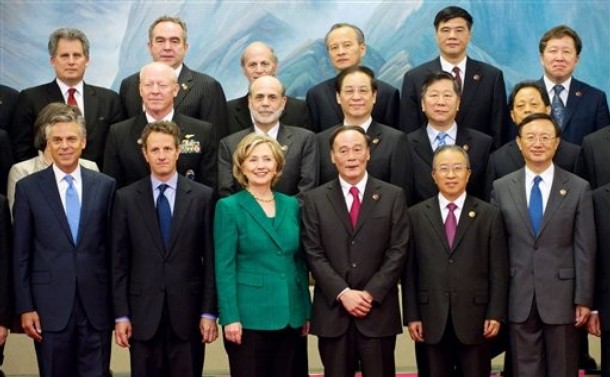
The Lowy Institute's Michael Wesley pours some cold water on the idea:
Today's US and China are not the same as America and the Soviet Union during the Cold War. The US and the USSR were superpowers, a word that's used so much these days that many have forgotten its original meaning: a power so much larger than all other types of state that collectively they would be no match for it. With this sort of power lead, any sudden change in relations between Washington and Moscow – for better or worse – had a decisive effect on world politics.America and China do not possess that kind of power gap with other classes of states. Unlike just after the Second World War, today the rest of the world is much richer and much better armed.
Furthermore, the Cold War was driven by ideology as much as by power. Today, America and China do not represent powerful, universalist ideologies that speak to the development and doctrinal issues that confront many of the world's societies. Neither state can meaningfully be said to have ideological followers that see the other state and the doctrine it represents as an existential threat to their way of life.
I'd say that many politicians and analysts in America would vigorously contest that last point. America, they would argue, does represent a universalist ideology. Indeed, many of the strongest proponents of that notion believe we cannot live securely in a world populated with political systems that do not share our views and thus have a positive obligation to go forth and spread the revolution. Granted, this idea does not seem to have many takers in the current administration - but administrations change.
We also can't predict how China will ultimately behave as (if?) it continues to close the power gap with the United States.
(AP Photo)
Google has just released a new tool that reveals which governments have requested that Google remove content from its search engine or videos from YouTube. Topping the list: Brazil followed by Germany, India, the U.S. and South Korea. Unfortunately, the number of requests issued by China is considered a "state secret" and was not made public.
Add this to the "Iran can be contained" files.
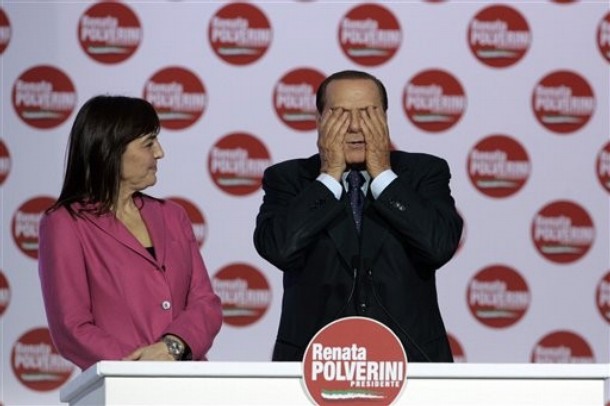
Alexander Stille unpacks the phenomena:
Berlusconi has transformed the political life of a major nation into a kind of reality TV show in which he is star, producer, and network owner: he is the ultimate “Survivor,” who will lie and cheat to kick others off the island as well as “The Bachelor,” distributing roses to a group of beautiful young women. Consider that Berlusconi’s approval ratings are consistently higher than Barack Obama’s. As The Daily Beast pointed out recently, Obama’s TV ratings and poll numbers have gone down in lockstep as his health care legislation has been weakened and unemployment has remained high: “The fact is he had 49.5 million listeners to [his] first speech on the economy. On Medicare, he had 24 million. He’s lost his audience…. He has plunged in the polls.” Berlusconi, facing public scandals similar to those of Tiger Woods and John Edwards, has kept his audience.Berlusconi has understood that contemporary politics is a permanent campaign. In the old days, a US president campaigned for six months and governed for three and a half years. Obama rather quaintly followed this old-fashioned model, working largely behind the scenes to promote health care and other legislation, while the Republicans held the stage, claiming that the Democratic plan imposed “death panels” and socialized medicine. Berlusconi would never have let that happen.
(AP Photo)
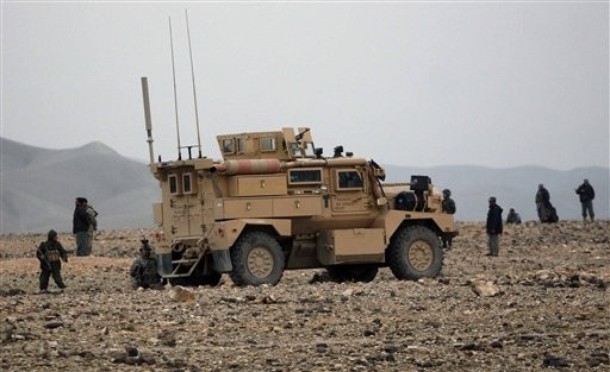
Angus Reid has a new poll out measuring American sentiment toward the war in Afghanistan:
This month, 51 per cent of respondents (down three points since February) say they support the military operation involving American soldiers in Afghanistan, while 39 per cent are opposed (up one point).Two-in-five Americans (43%) believe the country did the right thing in sending military forces to Afghanistan, while three-in-ten (31%) think it made a mistake.
Overall, 52 per cent of respondents say they have a clear idea of what the war in Afghanistan is about.
When The War is Over
When asked about what they think will be the most likely outcome of the war in Afghanistan, the findings show little fluctuation since February. One-in-four Americans (25%,) expect a clear victory by U.S. and allied forces over the Taliban, and 26 per cent foresee a negotiated settlement from a position of U.S. and allied strength that gives the Taliban a small role in the Afghan government.
Significantly fewer respondents foresee either a negotiated settlement from a position of U.S. and allied weakness that gives the Taliban a significant role in the Afghan government (9%) or a military defeat of U.S. and allied forces by the Taliban (4%).
As for whether people have confidence in the administration, Angus Reid found greater skepticism:
Only 33 per cent of respondents (-2) are very or moderately confident that the Obama Administration will be able “finish the job” in Afghanistan, while a majority (53%, +1) are not too confident or not confident at all.
Daniel Larison further analyzes Michael Auslin's contention that any reduction in American defense spending will cause a cascade of failures across the international system:
Auslin had warned that Chinese military build-up, Russian influence in post-Soviet space and an Iranian bomb would lead to a situation in which “global trade flows will be stressed, the free flow of capital will be constrained, and foreign governments will expand their regulatory and confiscatory powers against their domestic economies in order to fund their own military expansions.”One of the reasons I didn’t originally address these concerns is that I don’t find these to be the likely consequences of China’s continued rise, Russian resurgence in its own neighborhood and Iranian membership in the nuclear club. Why will global trade flows be stressed? China is heavily dependent on its export trade to sustain economic growth at home. It has no incentive to disrupt or “stress” trade flows or to embark on policies abroad that would lead to this. At present we see increasing economic integration of Taiwan with the mainland, and the Hatoyama government has held out the possibility, however remote it is at the moment, of forming an East Asian economic community modeled on the European Union. China is investing in (and exploiting) markets all over the world in states where Western companies typically do not go or where they are not allowed to go. So why will the free flow of capital be constrained if China continues to increase its military power? Are we not instead seeing increased trade carried out by and among the BRIC nations? Aren’t emerging-market countries, including China, engaging in noticeable economic innovation?
In this vein it's worth reading Anthony Bubalo & Malcolm Cook's piece in the American Interest (sub required), documenting the rise in investment between China, Russia, and India and all across Asia and the Middle East. The reason Asia is growing in economic might is because of a growing trading network. They're participating in the global economy in ways that benefit them and trying to close it off to the U.S. or create an autarkic regional bloc doesn't appear to be the goal. And if it was, one way to breach it would be to get more trade deals through Congress and move to patch things up with India.
I realize I'm really late to the party on this Gates Iran memo story but, to be honest, I find it mostly overblown and par for the course of internal administration dialogue (Richard Haass, keep in mind, pieced together thoughtful memos of dissent back in 2002 and 2003, yet still supported the eventual invasion of Iraq).
Marc Ambinder, drawing a parallel to the 2005 NSA disclosures, writes:
Whoever leaked this memo to the Times has to bear the responsibility of knowing that they could very well have fortified Iran's intention to resist international pressure, that it could very well have complicated the careful cultivation of China and Russia on sanctions, that it could steel Israel's spine in ways that would be perhaps deleterious for the region.
My reaction: Eh. I think this is a classic case of beltway over-thinking. Think about it from the Iranian regime's perspective: you're covered on two fronts by tens of thousands of U.S. (and other Western) forces; Washington is arming and rearming your regional foes; it's rather obvious that either Israel, or the United States or BOTH are engaging in some sort of covert sabotage campaign against your nuclear ambitions, and one of your nuclear officials just defected to the West - a defection obviously facilitated by your enemy, the Saudis.
One memo doesn't change these realities for the Iranian regime, it simply affects the minds and already entrenched opinions of those in Washington.

Aaron David Miller's must-read essay on why he's abandoned one of Washington's most cherished orthodoxies - the peace process - has set off a debate about the future of America's most favorite past time.
The fact that the U.S. has labored so long at something without succeeding is either a testament to its valiant persistence or foolish obduracy (or both). Either way, the current attempts to revive Israeli-Palestinian peace talks seems hopeless, which leads to an obvious question: what does a "post peace process" American diplomacy looks like? For Israel, at least in the short term, it looks quite good. They continue to receive American support without enduring American demands. For the Palestinians, the short term looks bad. Whatever hopes they had of prying further concessions from Israel will vanish.
Over the medium-to-long term the prospects for both parties will shift. Israel will face the demographic challenge of a blossoming Palestinian population living under its control. Demands for a "one state solution" will grow and the democratic and Jewish character of the state of Israel will be under strain. So too will the prospects for a negotiated settlement.
Consider the views of the Palestinians in 2010:
Residents of the West Bank and Gaza Strip are opposed to the creation of a Palestinian state within the 1967 borders with some land exchange as part of a final solution to the current impasse with Israel, according to a poll by An-Najah National University. 66.7 per cent of respondents reject this notion.In addition, 77.4 per cent of respondents reject making Jerusalem the capital for both an eventual Palestinian state and Israel.
It strains credulity to believe that this outlook is going to be reversed as the demographic balance between Israelis and Palestinians shifts.
(AP Photo)
In some sense Obama's new policy, rather than the wishes of the Democratic Congress, reflects the new Democratic majority, even as it is at odds with the country at large (63 percent of the American people express support for Israel). More to the point, no alliance can long withstand such a marked divide, in which Republicans are overwhelmingly pro-Israel and Democrats quite clearly are not -- that divide leads to something like the radical change of heart from Bush in 2008 to Obama in 2009. - Victor Davis Hanson
Hanson is right to suggest that we're seeing some fairly sharp partisan divergence over Israel. But I think he's wrong to suggest that President Obama is somehow broadly out of step with the American people when it comes to his policy toward Israel.
As proof of his claim, Hanson relies on the Gallup poll sited above, but nowhere does that poll imply that somehow President Obama is anti-Israel. And there have been others polls which suggest that public opinion on the Israel-Palestinian issue is less clear cut: an Economist/YouGov poll in March showed a more nuanced picture of American sympathies in the Mideast conflict. A Zogby poll showed a majority thought the Israeli-Palestinian conflict was harmful to U.S. interests and 50 percent of respondents said the U.S. should steer a "middle course" between the two parties. Earlier in March, Rasmussen found that 49 percent of Americans thought Israel should be required to stop settlement building as part of a peace deal.
Now put this in the context of what President Obama has actually done: publicly and repeatedly affirmed America's "unbreakable" commitment to Israel's security, exerted considerable efforts trying to derail Iran's nuclear program, relaunched the peace process, ratcheted up public criticism of settlement building and denied Prime Minister Netanyahu a White House photo-op. A fair-minded observer could disagree with some of these decisions and argue that the Obama administration has behaved boorishly and counter-productively toward an ally by criticizing it in public. But I don't think we can conclude - as Hanson does - that these policies reflect an administration in the grip of "campus multiculturalists" or that they're otherwise way out of step with the American public.
Bill Kristol didn't like what he heard from the Chairman of the Joint Chiefs of Staff yesterday when he said that military strikes and a nuclear-armed would be "equally destabilizing." Writes Kristol:
But Mullen's formulation of geostrategic equivalance ignores a massive difference between the two outcomes: Even assuming the degree and kind of "destabilization" would be the same in both the cases of attack and appeasement (which I don't think would be so), one scenario--attack--leaves Iran without nuclear weapons, at least for now; the other--appeasement--means Iran would have nuclear weapons going forward. Which unstable outcome is less damaging to U.S. interests? I think the answer is pretty clear: An attacked Iran that does not have nukes.
One problem with the formulation above is Kristol's seeming belief that any U.S. military strike on Iran does not escalate. Bombing a few Iranian nuclear sites - even if it provokes some blowback against U.S. troops in Iraq and Afghanistan - is a more palatable option than having to wage a broader war against the country, but no one can guarantee that one step does not lead to another. Imagine, for a moment, that a few days after the U.S. airforce reduces Natanz to rubble, a few American airliners are blown up at the hands of Hezbollah terrorists. The U.S. would have to respond. As Reuel Marc Gerecht argued in Kristol's own magazine, it would be unwise to think that a "limited" military operation against Iran wouldn't blossom into something much larger - in part because we couldn't be sure we did enough damage to Iran's nuclear capability without some kind of ground presence and because Iranian reprisals could force our hand.
America would win any military confrontation with Iran, but as we've seen in both Iraq and Afghanistan, that's almost besides the point. Military victories are transitory without some kind of durable post-war settlement - and Washington's track record in this regard doesn't inspire one with a lot of confidence. So I think we can read Mullen's "geo-strategic equivalence" as a plaintive cry against having a third Humpty Dumpty in the Middle East that the U.S. military is somehow supposed to patch together again.
Democracy in America pours some more cold water on the idea that other countries are "free riding" on American military power.

Noah Shachtmann passes along Admiral Mullen's thoughts on a military attack on Iran's nuclear facilities:
“Iran getting a nuclear weapon would be incredibly destabilizing. Attacking them would also create the same kind of outcome,” Mullen said. “In an area that’s so unstable right now, we just don’t need more of that.”
“I worry about Iran achieving a nuclear weapons capability. There are those that say, ‘C’mon Mullen, get over that. They’re gonna get it. Let’s deal with that.’ Well, dealing with it has [results] that I don’t think we’ve all thought through. I worry other countries in the region will then seek -– actually, I know they will seek — nuclear weapons as well. And the spiral headed in that direction is a very bad outcome,” Mullen said.
As Shachtmann observes, this is a situation with absolutely no good outcomes in sight.
(AP Photo)
Do you live in or around the New York City area? Foreign Affairs has kindly extended an invitation to RealClearWorld readers for what should be a fascinating discussion with Isobel Coleman, director of the Council on Foreign Relations' Women and Foreign Policy program. The event will be held on Tuesday, April 27.
The discussion is part of the magazine's Foreign Affairs LIVE series, and will take place at the Council on Foreign Relations building in Manhattan. There will also be an audience Q&A and post-meeting reception.
Event registration begins at 5:30 p.m., followed promptly by the discussion at 6 p.m. Seating is limited and first-come, first-served, so if you're interested please email us with your full name, contact information and professional or academic affiliation. More event details after the jump.
--------------
Foreign Affairs LIVE – April 27, 2010
Islamic Feminism & the Global Glass Ceiling
In Paradise Beneath Her Feet: How Women are Transforming the Middle East, Isobel Coleman explores how Muslim women and men are using progressive interpretations of Islam to support women’s rights in a growing movement of Islamic feminism.
Coleman’s forthcoming article in the May/June 2010 issue of Foreign Affairs complements her new book by providing a guide for businesses on how to empower women while also improving their bottom line.
On April 27 at the Council on Foreign Relations in New York, this exciting installment of Foreign Affairs LIVE will expose our readers to Isobel Coleman's research and insights.
________________________________________
Foreign Affairs Editor James F. Hoge Jr. will be moderating the discussion with our author:
Isobel Coleman, Council on Foreign Relations Senior Fellow for U.S. Foreign Policy; author of The Global Glass Ceiling: Why Empowering Women Is Good For Business (May/June 2010) and The Better Half (January/February 2010)
Business attire is required at all Council on Foreign Relations functions.

British poll watchers are in a frenzy over the surge by Nick Clegg, the Liberal Democratic candidate (who, incidentally, interned at the Nation magazine in the 1990's). According to the daily YouGov poll for the Sun, the third party challenger has actually vaulted ahead of both Labour and the Conservatives. (You can follow the latest twists and turns at the RCP UK election poll tracker.)
Among the many consequences of the Clegg ascendancy is the viability of Britain's "first past the post" electoral system. Lewis Baston explains:
Labour is resilient to a falling national share because it has an efficiently distributed vote – a large number of low-turnout strongholds, competitive marginals and few votes in its high-turnout hopeless seats.But because Lib Dem support is fairly evenly spread, it is hard for that party to translate broad increases in its share of the vote into seat gains, and the gains it does manage tend to come from the Conservatives.
The Lib Dems received respectable 20-30% losing shares in many constituencies in 2005, and a 10-point increase across the board would merely produce impressive 30-40% losing scores in most of these seats.
The electoral system could not survive a perverse outcome in which the first party comes third and the third party comes first – or one in which the second-placed party has an overall majority, despite the support of fewer than one voter in three. Either case would make Florida in 2000 look like a model of democracy. There would be a justified crisis of confidence in a political system that had produced such a travesty.
(AP Photo)
The BBC has released findings from a new poll showing a "marked improvement" in perceptions of the United States internationally:
Global views of the United States have improved markedly over the last year while views of many countries have become more negative, according to the latest BBC World Service poll across 28 countries. For the first time since the BBC started tracking in 2005, views of the United States' influence in the world are now more positive than negative on average.The survey, conducted by GlobeScan/PIPA among more than 29,000 adults, asked respondents to say whether they considered the influence of different countries in the world to be mostly positive or mostly negative. It found that the United States is viewed positively on balance in 20 of 28 countries, with an average of 46 per cent now saying it has a mostly positive influence in the world, while 34 per cent say it has a negative influence.
Compared to a year earlier, negative ratings of the United States have dropped a striking nine points on average across the countries surveyed both years, while positive ratings are up a more modest four points. Ratings of the influence of many other countries, meanwhile, have declined over the past year. On average, positive ratings of the United Kingdom and Japan are down three points, Canada down six points, and the European Union down four points. Ratings of the United Kingdom's influence in the world declined significantly in 11 countries and rose in only three.
Germany is the most favourably viewed nation (an average of 59% positive), followed by Japan (53%), the United Kingdom (52%), Canada (51%), and France (49%). The European Union is viewed positively by 53 per cent. In contrast, Iran is the least favourably viewed nation (15%), followed by Pakistan (16%), North Korea (17%), Israel (19%), and Russia (30%).
Despite Russia's place near the bottom, it has actually improved year-over-year from its low of 7 percent, according to the BBC. Other interesting details: the only two countries where majorities expressed negative views of the U.S. were Turkey and Pakistan.
Indian views on the U.S. have also shifted in a negative direction with positive perceptions dropping from 43 percent to 39 percent and negative views jumping from 20 to 28 percent.
You can read the full report here (pdf).
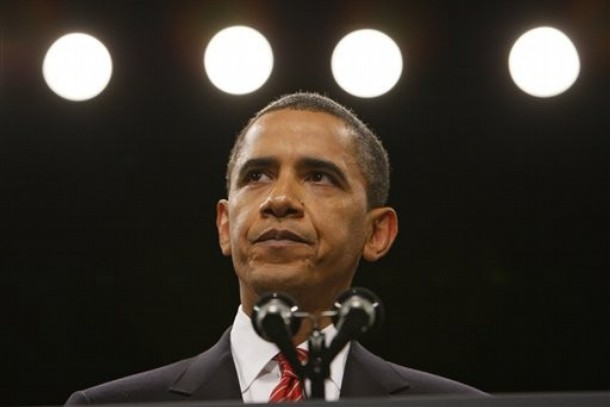
I have always operated under the assumption that the Obama administration would rather "live with" a nuclear Iran than launch a military operation to stop them. I based that assumption on the grounds that Obama opposed the Iraq war and was elected at least in some measure on the basis of his anti Iraq war stance. Given the rough similarities between a preventative war in Iraq in 2003 and a preventative military strike against Iran, combined with the public statements from some senior defense officials (Gates and Mullen), I figured Obama would pass on the opportunity.
Reading this piece in the NY Times, however, I'm less sure:
Pressed on the administration’s ambiguous phrases until now about how close the United States was willing to allow Iran’s program to proceed, a senior administration official described last week in somewhat clearer terms that there was a line Iran would not be permitted to cross.The official said that the United States would ensure that Iran would not “acquire a nuclear capability,” a step Tehran could get to well before it developed a sophisticated weapon. “That includes the ability to have a breakout,” he said, using the term nuclear specialists apply to a country that suddenly renounces the nonproliferation treaty and uses its technology to build a small arsenal. [Emphasis mine]
We don't know who this senior administration official is, so he or she could be talking out of turn, but the implications of the rhetoric are clear enough. If the diplomatic and sanctions tracks fail (which I suspect they will) the Obama administration will use military force. Is there any other way to read that? And does this really reflect President Obama's thinking?
(AP Photo)
Via Angus Reid:
A large proportion of adults in Israel would reject a prospective demand by U.S. president Barack Obama, according to a poll by Maagar Mochot. 70 per cent of respondents think Israeli prime minister Benjamin Netanyahu should not freeze construction in Jerusalem for an unlimited period of time.In addition, 83 per cent of respondents reject the imposition of a plan which would divide Jerusalem and leave Israel without control of the Jordan Valley.
Meanwhile, World Public Opinion has a slightly different look at the question of settlements:
A survey of the Israeli general public and Israeli settlers taken in early March shows three-fifths of the Israeli public (60%) support "dismantling most of the settlements in the territories as part of a peace agreement with the Palestinians." This is eleven points higher than the previous reading (49%) taken in December, 2009, and is the highest level recorded since 2005, during the debate over evacuating the Gaza Strip. Just one-third of the Israeli public (33%) opposes dismantling most settlements, including 13 percent very strongly opposed. This is the lowest level of strong opposition to dismantling settlements recorded by the Truman Institute for the 26 surveys in which this question has been asked since 2001.
Not surprisingly, Israeli settlers are less enthusiastic about the idea, but the survey also found an important disconnect:
However, the current near two-to-one Israeli public support for dismantling most settlements is misperceived by Israeli settlers, and even by the Israeli public to a lesser extent: Most settlers (57%) believe that a majority of the Israeli public oppose dismantling most settlements -- the reverse from what is actually the case. About one-third of the Israeli public (31%) believe a majority of Israelis supports dismantling most settlements, which is half the number who actually do so (60%).
Perhaps the most common refrain from the folks in Congress and the punditocracy who are demanding a drastic appreciation in China's currency (the RMB) is that the revaluation is absolutely necessary to reduce the "dangerous" US-China trade deficit. These currency hawks' underlying reasoning is simple: China's allegedly undervalued currency makes Chinese imports to the US cheaper and American exports to China more expensive, thus creating a woefully-distorted bilateral trade imbalance as compared to a situation in which both the RMB and USD "floated" based on market conditions. (See here and here for examples of this rhetoric.)
Assuming for a moment that the RMB is significantly undervalued, and that the bilateral trade deficit (or any trade deficit) is a problem for the US economy, there remains a very serious question of whether any sort of RMB appreciation, based on market factors or otherwise, will actually affect the US-China trade balance. The currency hawks certainly think so (it's their raison d'etre), but many scholars (and your humble correspondent) disagree, pointing to the recent history of the RMB and the US trade deficit, the past experiences of Japan's currency appreciation versus the dollar, and, of course, lots of economic analysis and modeling of structural factors in both the US and China - all of which strongly argue against the theory that RMB appreciation is some sort of "silver bullet" for the bilateral trade deficit. Indeed, a very interesting new study released by the Centre for Economic Policy Research provides even more such evidence (and a lot of other good stuff).
Unsurprisingly, currency hawks like Paul Krugman have brushed these sound criticisms aside, arguing that they fail to capture current market realities (or something). A story in Thursday's Wall Street Journal, however, provides very strong support for the currency skeptics' arguments about the disconnect between nations' currency policies and their bilateral trade balances - this time from what is arguably China's largest competitor, India.
As the WSJ explains:
While rival China has been criticized for holding down the yuan's value, India has let its currency surge over the past year. The rupee has risen nearly 17% from its record low in March 2009, and analysts forecast it could gain at least 3% more to 43.00 rupees to a dollar by year end.Conspicuous by its absence is central bank intervention. Back in 2007 when surging stock markets were driving massive capital inflows into the country, the Reserve Bank of India was quite content with occasional spurts of dollar buying to control excess volatility.
This time, the RBI has mostly stayed on the sidelines.
This news got me to thinking: given the strong similarities between India and China (e.g., population, education, per capita income and GDP, etc.), the effects of India's currency float and rapid appreciation the US-India trade balance could provide us with a crystal ball of sorts to see what might happen if China someday let the RMB float (and subsequently strengthen), as the American currency hawks demand. And if nothing else, the effects of the rupee's dramatic appreciation versus the dollar on bilateral trade flows can provide a good little test for the currency hawks' underlying theory that, even in today's globalized economy, "smart" currency policy alone can "correct" bilateral trade imbalances.
Well, unfortunately for guys like Chuck Schumer and Paul Krugman, the results of this particular test prove once again that they deserve an "F" in Modern Trade and Currency Policy 101.
The table below sets forth the average monthly USD-INR exchange rate, US exports to India, Indian imports to the US, and the monthly US-India trade balance between March 2009 and February 2010 (the last date for which trade data are currently available). "USD-INR" is the average exchange rate between the US dollar and the Indian rupee for the month at issue (data available here). As you can see, that number fell significantly over the 12 months selected - in March 2009, $1 bought you almost 52 rupees, and by February 2010, it bought only 46 - thus indicating a significant appreciation of the rupee versus the US dollar. Now, take a look at the US-India trade stats over the same period. Notice anything interesting (click to enlarge)?
Yep, that's right. As the rupee strengthened against the dollar, the US-India trade deficit, and Indian imports to the US, did not steadily decline, as the currency hawks unequivocally assert should happen. And US exports to India didn't steadily increase either. Hmm.
Thus, the US-India currency and trade data strongly undermine the idea that anyone can accurately predict how changes in currency policies will affect bilateral trade flows in an increasingly globalized economy. There's just too much going on beyond currency for it to dictate trade. Indeed, as the correlations listed above show, there's actually a weak, positive correlation between a stronger rupee and both increased Indian imports and an increased bilateral trade deficit, and there's a weak negative correlation between a stronger rupee and increased US exports. The graphs below make this counter-intuitive relationship clear (click to enlarge):
This first chart makes clear that, as the rupee steadily gained in strength, bilateral trade flows fluctuated wildly. Now let's isolate the USD-INR trend and the US-India trade balance:
Gee, that's not supposed to happen at all - the rupee appreciated, and the trade deficit grew. Well, what about US exports to India? Surely they benefited from the relative decline in the dollar's strength, right? Right?
Umm, OK, OK, but Indian imports just had to decrease, right?
Doh! That's three big strikes for the currency hawks. If they were correct that steady appreciation of a nation's currency versus the dollar would dramatically reduce its trade surplus with the United States, the bilateral trade balance and imports/exports trend lines above would actually be moving in the exact opposite direction! And the month-to-month export and import data would be far less erratic.
Now, I don't mean for a second to suggest that these data prove that the RMB's eventual appreciation against the US dollar will definitely lead to a larger US-China trade deficit (although that did happen a few years ago). Instead, my point is far simpler and, I think, far more important: the Indian rupee's recent experiences are further proof that, in today's globalized economy, the facts simply do not support the claims from currency hawks that a floating currency will narrow bilateral trade imbalances, or that RMB appreciation will definitely increase US exports to China and decrease both Chinese imports to the US and the US-China trade deficit. Is a market-based RMB a good idea for China and the global economy? Sure, but to claim that it will "fix" the US-China trade deficit or the US economy more broadly, is utterly without merit.
And the broader lesson remains, as usual: when politicians and economists state without equivocation that they know the precise impacts that China's currency appreciation will have on US-China trade flows and/or the US economy more generally, just stop listening to them. Because they haven't a clue.
Final note: Be sure to check out that CEPR study mentioned above. The main conclusions will not be surprising for readers of this blog, but they most certainly will be for those believers in the currency hawks' conventional wisdom. The study's conclusions, in short: RMB appreciation will improve China's global competitiveness and actually end up destroying American jobs. Oh goody.

Bolivian President Evo Morales is holding a star-studded climate change soiree in Cochabamba, which he claims:
will give a voice to the poorest people of the world and encourage governments to be far more ambitious following the failure of the Copenhagen summit.
So concerned is Evo with the plight of the poor that he's buying himself a jet built for the Manchester United team:
Bolivia's Treasury Minister Luis Arce says the government is negotiating to buy a French Falcon 900 jet built for the needs of Britain's Manchester United. The price: $38.7 million.
The British soccer team declined to purchase the jet after it was finished, so Morales rushed to buy it, according to Agence France Presse, which also reports that Morales will have another jet, a $40 million Antonov BJ financed through a military credit from Russia.
Morales has been busy this month. While tightening his grip over the country following local elections earlier this month, Morales had recently accepted the third donation of military equipment from China.
Perhaps Evo will fly his Chinese friends and his celebrity friends to the inauguration of the Bolivian Space Agency's new satellite: China and Bolivia are working on a $300 million joint satellite project:
According to Bolivian Public Works Minister Walter Delgadillo, the satellite has a maximum capacity of the DFH-4 model that will enable it to cover not only Bolivia but also the whole Latin America.
China had previously helped Venezuela launch a satellite in 2008.
(AP Photo)

Walter Russell Mead has some good observations on American power which are worth reading. His basic contention is that America is likely to remain what is was during the Cold War, the preeminent power. That doesn't mean we get our way, but it also means that no other country has the ability to set the international agenda like America does. Mead writes:
Although this is going to be tumultuous and challenging century, the outlook for America’s continuing world role is pretty bright (assuming we maintain the domestic sources of our wealth and strength). The rise of China is not, or does not have to be, the kind of challenge to American power that, for example, the rise of Germany posed to Britain one hundred years ago. China is rising — but so are India, Vietnam, Indonesia, Korea and Malaysia. China’s destiny is probably not to leverage its hegemonic power in Asia into a global challenge to the American system. Rather, it is more likely to concern itself with building a stable Asian state system which will rest in part on America’s continuing presence as an off shore balancing power and guarantor of the peace.It is not the cleverness of American foreign policy that makes this outcome likely; it is the geography and economy of Asia. Britain’s unique role in the 19th century European balance of power worked much the same way. Many European countries had larger populations and bigger armies than Britain did, but Britain’s offshore position and sea power enabled it to play a unique and global role.
I think this is largely correct but I don't know how Mead can write a long post about the future prospects of American power without reference to either Iraq or Afghanistan. Both represent still open-ended conflicts which are consuming American resources and attention. Doesn't American power look quite different if a stable Iraq allows for a full U.S. withdrawal vs. an unstable Iraq precipitating Surge II?
I wouldn't worry about American policymakers suffering from a surplus of cleverness, but we should be on guard against foolishness and hubris. Both were evident in the decision to invade Iraq (to say nothing of the planning and execution of the war) and both could easily manifest themselves again. The U.S. is large and powerful enough to absorb multiple mistakes and own-goals without severe consequences, but there's a limit, isn't there?
(AP Photo)

Nick Clegg, the Liberal Democratic candidate in the British General Election, may have had a break-out performance in yesterday's debate - the first ever televised debate among UK party leaders during an election campaign.
A Times of London/Populus poll gave the contest to Clegg:
Nick Clegg seized the initiative last night as the televised drama of Britain’s first campaign debate between party leaders transformed the election.A Populus poll for The Times gave a stunning victory to the Liberal Democrat leader as he used the limelight of the historic ITV broadcast to devastating effect.
“I know you think that all politicians are the same. I hope I have tried to show you that that isn’t true,” he said at the close of a relaxed and personable performance.
Within minutes, 61 per cent of voters said that he had won the night, compared with 22 per cent for David Cameron and 17 per cent for Gordon Brown.
YouGov has a similar finding:
Leaving aside your own party preference, who do you think performed best overall in tonight’s debate? Gordon Brown 19% David Cameron 29% Nick Clegg 51% Don’t know 2%
Meanwhile Frank Luntz provided his "Instant Response" analysis for the Sun and the results tracked above:
The panel showed an overwhelming triumph for Nick Clegg. He had more soundbites, better context and was successful in differentiating himself from the other two
Some video highlights are available here.
Is China destroying, or creating, American jobs? Two piece from the Internets today make opposing claims.
C. Fred Bergsten says destroying:
If China eliminated its currency misalignment and thus cut its global surplus to 3 to 4 percent of its GDP, that would reduce the U.S. global current account deficit $100 billion to $150 billion. Every $1 billion of exports supports about 6,000 to 8,000 (mainly high-paying manufacturing) jobs in the United States. Hence, such a trade correction would generate an additional 600,000 to 1.2 million jobs. Correcting the Asian currency alignment is by far the most important component of U.S. President Barack Obama's new National Export Initiative. Its budget cost is zero, which also makes it by far the most cost-effective possible step to reduce the unemployment rate and help speed economic recovery.Such exchange-rate realignment is not without precedent. In 2005, Beijing announced a new "market-oriented" exchange-rate policy and let its currency appreciate 20 to 25 percent. In mid-2008, however, China repegged to the dollar, and the renminbi has ridden it down, taking back about half the previous rise. China has doubled the scale of its currency intervention since 2005, now spending $30 billion to $40 billion a month to prevent the renminbi from rising; on this metric, its currency policy is about one-half as "market-oriented" as when it announced such a strategy five years ago.
Daniel Griswold says China is a large market for U.S. exports:
Regardless of its currency regime, China has been the hottest major export market for U.S. companies in the last decade.Since China began to gradually appreciate its currency in 2005, U.S. exports to the Asian giant have shot up by 69%, according to the U.S. Commerce Department. That compares to a much more sluggish 19% increase in exports to the rest of the world.
Export of U.S.-manufactured products was up 47% during that same period, compared with an anemic 7% increase to the rest of the world. China alone accounted for half of the dollar-value increase in durable goods exports, led by civil aircraft, semiconductors and industrial machinery.
U.S. farmers have enjoyed great success in China's market. Since 2005, U.S. agricultural exports to China have more than doubled, from $5.7 billion to $13.8 billion. Farm exports to China have been growing three times faster than farm exports to other countries. China now buys more than half of U.S. soybean exports.
If American exports of goods and services had enjoyed the same rate of growth in the rest of the world as they have in China since 2005, U.S. exports would have increased by an additional $600 billion during that period.
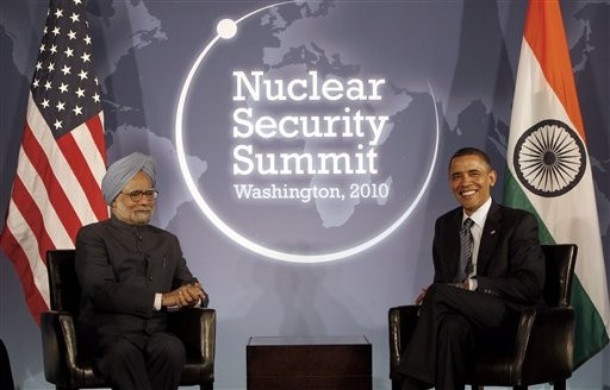
There is a growing chorus of voices warning the Obama administration that it is veering off-course with India. Evan Feigenbaum offers some advice:
The administration needs to ramp up its relationship with India now. After all, even if Obama does everything right–and many Indians believe he has gone badly wrong in Afghanistan and with Pakistan–there will still be constraints on the U.S.-India relationship. India has moved beyond nonalignment, to be sure, but it has yet to coalesce around a new foreign policy vision. And although New Delhi may ultimately settle on a strategy that is conducive to a more open and global partnership with the United States, that is not assured.
In the American Interest (sub required) C. Raja Mohan makes the case that India can become an expeditionary military power (as it was under the British) and partner with the U.S. in global security.
The idea of a strengthened U.S.-India alliance is very appealing for all the obvious reasons: they're a large democracy with a growing economy located in the heart of Asia. But our relationship with Pakistan, and the counter-insurgency in Afghanistan appear to be greatly complicating efforts. I don't know how - or if - there's a formula that can keep Pakistan happy while cultivating an alliance with India (and vice-versa). Tilt too far toward India, and Pakistan has every reason to nurture its ties to Islamist terror groups as a hedge, undermining whatever fragile progress we've made in Afghanistan. Tilt too far toward Pakistan, and we'll lose a most promising strategic partner.
(AP Photo)
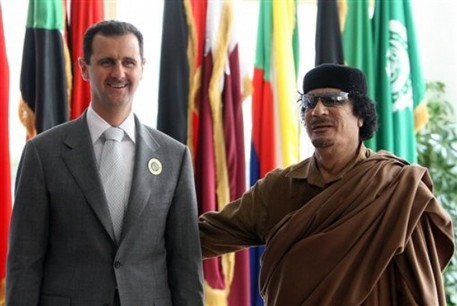
What motivates Damascus? It may just be plain stupidity, argues Blake Hounshell:
The insane thing about all this is that Syria would be much better off by joining the pro-Western camp. It could get the Golan Heights back, get the sanctions lifted, and attract foreign assistance and investment -- while fending off pressure to open its deeply authoritarian system, just as Egypt has. It could reap billions in tourism revenue, thanks to its incredible archaeological and cultural riches. And it could finally bury the hatchet with other Arab states, which have long been frustrated by Syria's close ties to Iran, its support for militant groups, its meddling in Lebanon, and its intransigence on all things Israel.But dictatorships are strange animals; they often make poor decisions for reasons that are inscrutable to all but the most informed observers.
(AP Photo)
Which IR box does Obama fit in? Is he Carter, Bush 41 or Bush 43? Dan Drezner wonders:
Moving from personalities to ideas, the realist/idealist divide, you still wind up with a muddle. Bob Kagan is right to say that Obama's desire for a nuclear-free world is about as idealistic as one can get. Similarly, Obama's affirmation of multilateralism doesn't seem terribly realist either. On the other hand, his policies towards great power rivals like Russia and China, and dependent allies like Israel and Afghanistan, seem pretty damn realist. Much like his Nobel Peace Prize address, the Obama administration's latest foray into the less shallow waters of international relations theory offers a sliver of support to all major IR approaches.Which box you put him in, I suspect, depends on which policy dimension you think matters most. Human rights advocates will use the r-word; fans of nuclear deterrence will use the i-word. As someone concerned with the management of great power politics, I'd be comfortable calling Obama an realist, but I'm biased -- I speculated that this was the approach the post-Bush president would be forced to pursue.
I think much of this really depends on the issue itself, as well as the advisers in the president's ear on the matter. If, for example, nonproliferation makes one an IR idealist, then how do we classify Reagan? And I happen to agree with Drezner's final point; a president's hand is often forced by the times and circumstances.
I think this is a bigger rant for another time, but overall, you already know what I think.
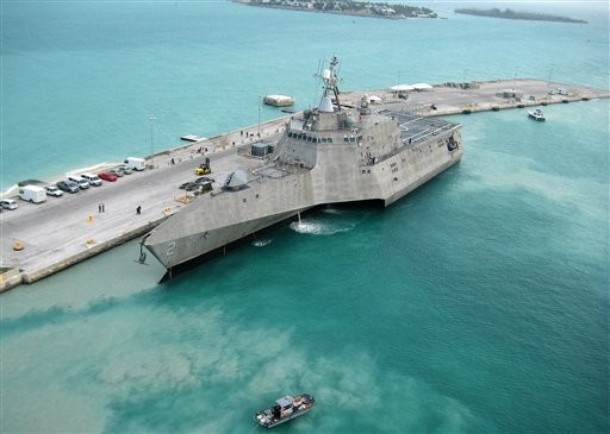
Lowy's Graeme Dobell notes the emergence of a new American security paradigm in Asia:
The Guam stopover will underline the point that the US is spending billions on the island as a fresh assertion of its continuing role as Asia's military guarantor. A previous column offered this translation of the doctrine that will be blessed when Obama makes his Guam touchdown: 'We're going to be here for a long time yet.'But my translation sentence is deficient because it reflects only the military dimension of the new doctrine. The beauty of what Obama will offer is that it will have a second, multilateral (Concert of Powers) dimension, building on the military framework of the US bilateral alliance system in Asia.
A translation of both dimensions of the Obama doctrine would look like this: 'We're going to be here for a long time yet, but we are certainly ready to talk about new ways to run the neighbourhood.' Or to put it more formally: the new doctrine will link a continuing assertion of US military capability to a willingness to think new thoughts about Asia's security architecture and a concert of powers.
As Dobell notes, the original "Guam Doctrine" enunciated by President Nixon (that countries had to front their own defense against non-nuclear threats) set of a scramble in Asia that continues to this day. Any new doctrine, I think, should enshrine Nixon's admonishment even as it seeks to build more cooperative relationships across the region.
(AP Photo)
For all its singularly destructive actions, the Bush administration might very well be the only administration to have ever challenged the fundamental premises of US policy in the Middle East.After the attacks of Sept. 11, liberals complained that Republicans failed to grasp the root causes of terror. But in their own way they did. Republicans offered an intuitive, if overdue, interpretation: Without democracy, Arab citizens lacked peaceful means to express their grievances and were therefore more likely to resort to violence. Thus, in order to rid the region of extremism and political violence, an ambitious, transformative vision of promoting democracy became not only necessary but urgent. - Shadi Hamid
There are a few points to make here. The first is to question the very premise that political structures in the Middle East are fomenting terrorism. How, then, to explain the existence of America citizens, born and raised in a democratic culture, turning to terrorism? Or any of the plots hatched in Europe by European citizens. They had ample opportunities to channel whatever grievances they held through democratic means, and yet they still choose terror. I think you could make a fair case that a democratic Middle East would help ease the terrorist threat, but would it be decisive?
The other point to make is to note the disconnect between the Bush/neoconservative push for democracy in the Middle East and their conception of America's interests in the region. The argument for Middle East democracy that Hamid sketches above sees political participation as a release-valve for Arab grievances. But what are those grievances? As they relate to the United States they are: the basing of U.S. combat forces in the region and support for Israel.
So the idea that democratic participation would actually give aggrieved citizens some relief seems to imply that a democratic government would actually have to address and ameliorate those grievances.
In such a context, it wouldn't be unreasonable to conclude that the advance of democracy in the Middle East could mean empowering governments that take a decidedly colder attitude toward America (and Israel). They might not go so far as to sever ties, but if you consider that a long-standing and democratic ally like Japan wants to reconfigure America's basing agreements, it wouldn't be a stretch to see newly empowered democratic states in the Middle East start pushing back against American military power in the region.
If you'd like to see fewer American troops and less American meddling in the Middle East, in other words, than you should indeed be pushing for greater democratic participation in the region. And yet that sits at cross-purposes with much of what I understand the contemporary Republican and conservative position to be - which is to entrench American military power and influence over the region.
I suspect this is why, for all the talk, President Bush never really leveraged American aid and influence in the Middle East in such a way as to truly endanger any incumbent autocrats. If Bush grasped at the kernel of a sound idea, he and his advisers were likely scared off by its implications, especially after the elections in the Palestinian territories.
UPDATE: Daniel Larison has some good observations on the issue here and here.
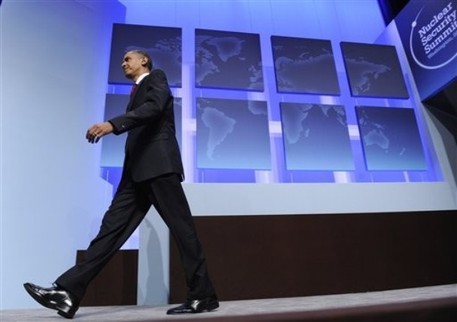
Assessing President Obama's recent Nuclear Posture Review, Tom Barnett writes:
Does this new doctrine make non-state actors any less likely to attack America with weapons of mass destruction? No. The NPR reiterates America's intense desire to hold accountable anybody who aids non-state actors in their acquisition of WMD, but it basically avoids any clear statement of how it will strategically respond to the successful use of WMD by terrorists against the United States. All that non-state actors can infer is that any non-nuclear WMD attack verifiably launched from an NPT-compliant state would not automatically trigger a U.S. nuclear retaliatory strike. Since al-Qaida and other extremists would probably welcome such a reflexive nuclear retaliation, they might judge this new doctrine a mild disappointment, but hardly a strengthened deterrent.So we're left with this underwhelming effect: States not currently seeking nuclear weapons are assured that America won't mindlessly "go nuclear" on them if non-nuclear, but still-strategic attacks are launched from their soil. If such states actually harbored a huge and growing fear about this kind of scenario -- a fear so great that it was keeping them from cooperating with the West on stemming nuclear proliferation -- then I would say that Obama had accomplished something real with this change. But as no such dynamic is at work, I instead spot the latest example of Obama's occasional penchant for exquisite rhetoric masquerading as "change you can believe in."
I think what's really in conflict here is the politics of the presidency and the actual levers at the American president's disposal. We've become accustomed to expecting anything and everything from the executive, especially since the September 11 attacks. This, as I have argued, has resulted in a rather frenetic and, at times, reckless foreign policy.
The Iraq War, in many ways, represented the nadir of American unilateralism. It exhausted much of the capital gained by the 9/11 attacks and, to paraphrase Colin Powell, sucked all of the oxygen from the room. This, coupled with an increasingly multi-polar world order, has brought the foreign policy and domestic politics contradiction to to the forefront. Thus, President Obama must talk in grandiose, game-changing proses, while in truth applying a policy of what we might call a sane status quo at best. This creates the bizarre political environment we see today, where being the domestic political opposition is in truth the better place to be because it permits a kind of hyperbolic insincerity that may never be tested in any real policy realm. (Democrats certainly aren't exempt from this behavior; remember partitioning Iraq?)
The United States is still by far the most powerful and influential country in the world, but none of that will matter if Washington fails to ever reconcile actual ability with the unrealistic expectations of the presidency. Being the Leader of the Free World matters far less than being a reliable and honest partner in the multi-or-non-polar one.
(AP Photo)
According to a new CNN poll (pdf) 70 percent of respondents said the Senate should ratify the START treaty.
The poll also found that 55 percent of respondents thought that it was somewhat or very likely that the U.S. would suffer a nuclear terrorist attack in the next decade. And 38 percent said it was somewhat or very likely that the U.S. was going to be involved in a nuclear war in the next decade.
A new poll from Angus Reid:
Many adults in the United States foresee an act of terrorism taking place on U.S. soil in the next year, according to a poll by Angus Reid Public Opinion. 69 per cent of respondents think an attack carried out by foreigners is likely to happen, while 58 per cent feel foresee an act of terrorism carried out by Americans.
Full results from the poll here - it's mostly focused on domestic militia and the likelihood of civil unrest in the U.S.
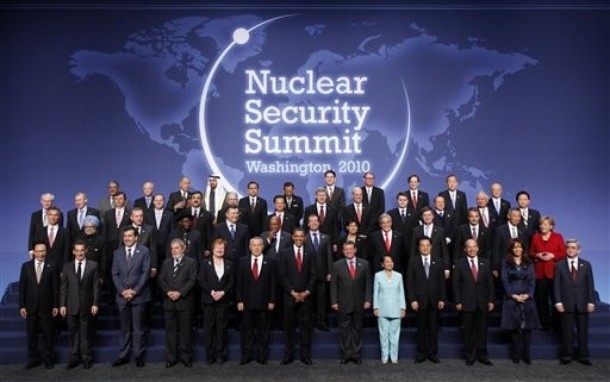
What did President Obama achieve during the just-concluded nuclear summit? Max Bergmann says a lot:
Bilateral deals were struck with the Ukraine, Chile, Canada, Mexico — all agreeing to give up their stockpiles of highly-enriched uranium. Furthermore, Russia agreed to eliminate 68 tons of weapon grade plutonium, enough for 17,000 nuclear weapons. Other countries agreed to additional steps to improve port security and to address nuclear trafficking.Additionally, the final communique from the summit achieves a consensus on the dangers of nuclear terrorism and it gets nations to make commitments to secure all their vulnerable nuclear materials within four years. Importantly, it lays out a “work plan” for countries to follow and to ensure countries live up to these pledges, South Korea will hold a follow-up nuclear summit in two years to put pressure on countries to follow through.
All very sensible achievements in my view. But consider the scope of the conference. According to the Times, it was "the biggest gathering of heads of state by a US leader since the founding of the UN in 1945." Was a similarly historic agreement hammered out? It doesn't appear so.
I do think there was an unfortunate element of hysteria that pervaded the summit - what Spencer Ackerman might disparage as "the politics of fear." Obama invoked Albert Einstein to the effect that the world was "drifting toward a catastrophe beyond comparison."
So what are the chances that al Qaeda could acquire, transport and detonate a nuclear weapon into the continental United States? We know they have tried in the past (and have been scammed in the process) and presumably are trying to do so now, but some things may simply be beyond the means of even the most motivated terror organization. Consider, as RCW contributor Todd Crowell highlighted recently, the experience of the Japanese terror cult Aum Shinrikyo. They had a large facility for producing chemical weapons, a nuclear lab in Australia and were well funded and the best they were able to do was the 1995 Tokyo subway attack which killed 13 people with Sarin nerve gas. A tragedy, yes, but not a "catastrophe beyond comparison."
And, as Michael Brenner observes the al Qaeda threat today is not what it once was:
Obama made this the leitmotif of the conference in his public remarks yesterday to the effect that terrorism is the most important nuclear threat we face. That is simply untrue. An accurate statement designed to educate rather than to play on emotions would say that the seizure of nuclear materials by ‘al-Qaeda’ would create a vitally dangerous situation BUT it is not an urgent concern because the likelihood of such an eventuality coming to pass is close to zero. The old al-Qaeda is a weak, fragmented grouping able to do little more than survive physically. This is the outfit that, over the past 8 + years, has been capable of organizing nothing of great consequence. The London and Madrid bombing were essentially local operations; the Christmas bomber incident rank amateurism. Trying to blow a plane out of the sky once every several years is not a laughing matter; but to cite it to stoke fears of nuclear terrorism is rank scare-mongering with no evidential basis. Right out of the Bush-Cheney playbook. An outfit that cannot manage to get its hands on fire-retardant underwear will not be able to build or steal a nuclear warhead.
The fact that al Qaeda is a shell of its former self is no reason not to lock up loose nuclear materials. They could still surprise us, there could be other organizations similarly determined to cause havoc, or even deranged individuals that might want to get their hands on fissile material. But if we truly want to reduce the chances of a terrorist group getting their hands on nuclear weapons, you'd have to do more than lock-up unsecured stockpiles. You'd also have to eliminate nuclear weapons (which is impossible) but perhaps more importantly, dramatically curtail the use of civilian nuclear power, which seems unlikely.
(AP Photo)

One item in the Tory manifesto has caught a few American bloggers' eyes: a pledge to institute "California-style" referendums on public policy issues if they can garner the support of 5% of the population. Alex Massie objects:
As commenters have pointed out and as California's experience demonstrates these can easily fall prey to powerful interest groups. This is especially so if the threshold for putting an issue on the ballot is too low. And 5% of available voters is, I'd hazard, too low. Apart from anything else experience suggests that you can get 10% of voters to believe in just about anything.Consider this example from tonight's YouGov tracking poll: 11% of voters say they'd like to see a "Grand Coalition" in which the Tories, Labour and the Liberals share power. That's madness, obviously and a reminder that when turnout is too high or too low it can be heavily influenced by people who really ought not to be allowed anywhere near a polling place. The other problem, mind you, is that most of us are, on some given issue, one of those people...
Matthew Yglesias raises further competence concerns:
In general, I think the key to getting the political process right is to understand the importance of popular participation in consenting (or not) to policy proposals veruss the importance of technocratic design of policy proposals. The problem with California’s initiatives isn’t so much that the public gets to vote on them as that the actual proposals themselves are designed by interest-group advocates who aren’t accountable for the consequences of their ideas and generally lack the technical competence to draft sound proposals. One strength of parliamentary systems is that even rank-and-file legislators primarily have a consent (or not) role while policy design is in the hands of ministries
Personally, I think Kevin Drum has it right: since when did California become a model for good government?
(AP Photo)
The election in Great Britain is shaping up to be an interesting contest:
To read about their policy prescriptions from the source you can see the Labour and Tory websites.
For more videos on topics from around the world, checkout the Real Clear World videos page.
This is a little old, but a Gallup poll from 2008 shows that Kyrgyzstan favors tighter relations with Russia than the U.S.:
A Gallup poll in July 2008 showed Kyrgyzstanis giving Russia the edge: Nearly two-thirds (63%) said it is more important for their country to have relations with Russia, even at the expense of relations with the United States.Indeed, throughout Central Asia, Gallup found the same result - either very strong support for close ties with Russia even at the expense of ties with the U.S. or a desire to have good relations with both. If push came to shove, few chose the U.S. over Russia. Something to consider when we hear talk of Russia "exerting influence" over its near abroad.
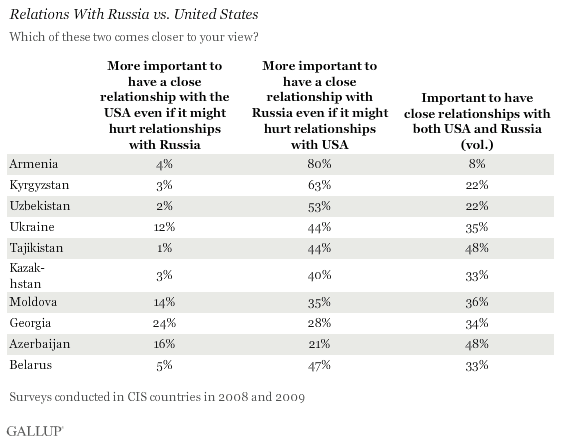
Max Boot flirts with realism:
I don’t have a problem with the fact that Obama isn’t doing much to promote democracy in states that are strategic allies. My problem is that he has missed — and is still missing — a golden opportunity to promote democracy in the country that happens to be our deadliest enemy at the moment. He has let the Green Revolution come and go in Iran while maintaining a hands-off attitude. There is surely a case to be made for attempting to reach a modus vivendi with the Nazarbayevs of the world — dictators who are concerned only with keeping power and are willing to accommodate our interests. There is no case to be made for accommodation with the Ahmadinejads and Khameinis of the world — dictators with grandiose ambitions that threaten ourselves and our allies and who have no interest at all in reaching any kind of entente with us.
I wonder if such a pose - democracy promotion when it aligns with our strategic interests - is really all that tenable. Isn't this a rather bald-faced hypocrisy? Why would anyone take the idea of political liberalism seriously if the U.S. - the supposed standard-bearer of the concept - holds it as nothing so much as a cynical cudgel to wield against regimes it disapproves of?
And I would disagree that there's "no case to be made for accommodation" with the "likes" of Iran's rulers: isn't Nixon-to-China a pretty good example of accommodating a regime we loathed (which had nukes and an orders of magnitude worse record on human rights) to achieve a larger strategic good? We accommodate Pakistan and you could make the case that the rap sheet on that country is at least as bad as Iran's, if not worse. They supported the Taliban during the 1990s, providing crucial support for a regime that enabled 9/11. They have done more to proliferate nuclear weapons than any country on Earth. They are rapidly building out their nuclear weapons capacity while waging a terror war against their democratic neighbor. They have a military and intelligence service which is reportedly riddled with Islamists and they continue to release Taliban fighters who turn around and kill Americans in Afghanistan.
There are differences between the two countries, obviously. Pakistan gets a few billion a year in U.S. development aid for their trouble and Iran gets sanctions, to take one significant one.
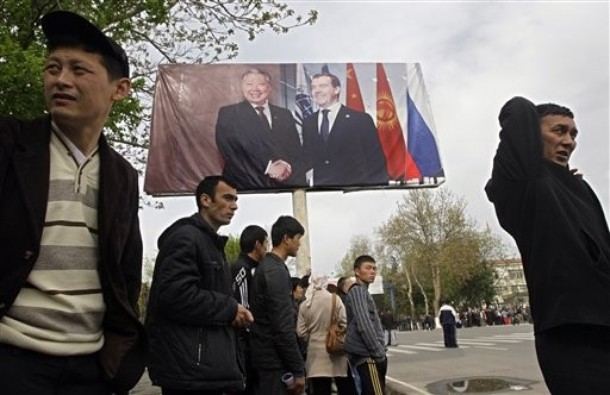
When the uprising in Kyrgyzstan broke out, Evgeny Morozov wrote a piece in Foreign Policy describing the revolt as an "analog" revolution. Sarah Kenzdior protests:
He compares Kyrgyzstan unfavorably to Iran, noting that the Kyrgyz did not use the internet for strategic purposes, but merely to spread information. He notes that Kyrgyzstan did not rate as highly as a “trending topic” in Twitter as did Iran in the summer of 2009 (while failing to mention that Iran has a population more than ten times larger than Kyrgyzstan’s). Such an evaluative perspective, in which countries are judged winners and losers by virtue of their search ranking, leads to headlines like Andrew Sullivan’s “This Revolution Will Not Be Tweeted” (an article about Morozov’s article). This revolution was tweeted. But unfortunately, the significance of those tweets is decided not by the people who wrote and read them, but by observers in the West. As a result of this, Kyrgyzstan becomes relevant only in its relation to other nations and other revolutions. This is the virtual equivalent of the Great Game, with Central Asia but an afterthought to which people can apply their pet theories. [Emphasis mine.]What we make of Kyrgyzstan’s internet content may seem irrelevant in light of the enormity of what has happened. But it is indicative of a deeper problem — a refusal to consider Central Asia in terms of Central Asia, a refusal to see the actions and ideas of Central Asians as meaningful in their own right.
A fair point, but couldn't the same be said about Iran or, in fact, most countries that happen to come into the news? Much of the intense interest over Iran's Green Movement lay in the fact that they may have represented an end-run around our problems with the ruling regime. The actual feelings and interests of the "greens" were relevant to most American commentators only insofar as their struggle was bound up in larger geopolitical issues between the U.S. and Iran.
I think it's right to cry foul on a certain parochial attitude about these events (one I'm certainly guilty of) and it's obviously important to try to understand the Kyrgyz revolt on its own terms. But on the other hand, revolutions and mass protests movements do often intersect with American foreign policy and viewing them in that light isn't illegitimate.
(AP Photo)

British election wonkery begins in earnest as Labour released their manifesto today and the Conservatives prep for their manifesto launch tomorrow.
First, Labour:
Lord Mandelson, the business secretary, described the manifesto as "Blair plus".The manifesto had been constructed under the conflicting pressures of severely constrained public finances, and the need to show that the government had not run out of energy.
In an effort to show its commitment to the poor, Labour made a series of pledges, including raising the national minimum wage, currently £5.80 an hour, at least in line with earnings to 2015. At present the minimum wage is linked to prices and the impact on employment, leading to a rise of only 13p this year.
The manifesto also sought to enshrine new rights for parents who want to change the running of their local schools, and new rights for patients seeking treatment on the NHS, including a guarantee of cancer test results within a week and a maximum wait of 18 weeks for specialist treatment. After that, private care would be offered.
On law and order, failing police forces could be taken over by successful neighbouring forces. The public would also be given a chance to have a say in what community sentences offenders would serve.
Full text of the Labour 2010 Manifesto here. (pdf)
Next, the Conservatives:
In a direct invitation to voters to join him in governing Britain, the Tory leader will promise in his election manifesto to offer California-style referendums on any local issue if residents can win the support of 5% of the population.Adopting historic language from the Labour movement about the "collective strength" of society, Cameron will also pledge to let people "be your own boss" as public sector workers are allowed to assume ownership of the services they provide.
The 119-page Conservative manifesto, the first in recent history to be produced in the form of a hardback book, has a sober, dark blue cover intended to illustrate the gravity of the financial crisis facing Britain. But Tory sources said that, between the covers, the manifesto will paint a dramatic picture of the central theme of Cameron's leadership – his ambition to preside over a "Big Society" in which power is handed down to users of public services and voters at a local and national level.
We'll post the text of the Conservative manifesto when it's released.
(Photo: Cover of the Labour 2010 Manifesto)
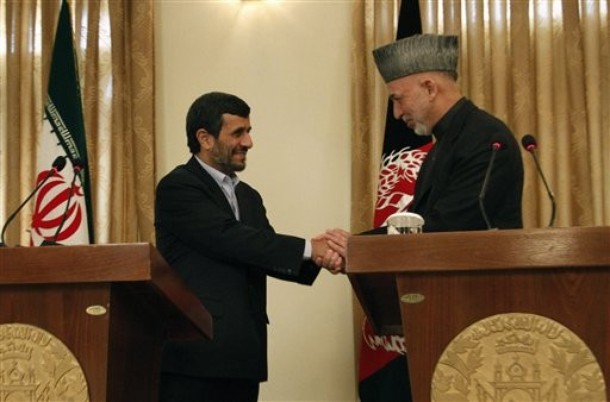
To add to Kevin's post on the Karzai-Obama spat, it seems to me that there's a third interpretation of the recent feud that falls somewhere between "President Obama's being naive and irresponsible" and "President Karzai's an out of control drug addict." That is that the spat is good for all parties. It's good for the U.S., because it sends a warning to Afghan officials that American aid is not a given and that there must be some movement toward meeting Washington's expectations with respect to corruption and governance. I largely sympathize with the idea that these messages should mostly be conveyed behind closed doors, but there's another important constituency that needs to hear Obama's message: the American taxpayer.
It seems perverse for the U.S. to take the position that Afghanistan has an open-ended claim on American blood and treasure irrespective of how its leaders behave (it's perverse stance in good times, too). A public scolding at a minimum assures Americans that the president is mindful that resources are limited and not to be doled out lightly.
It's good for Karzai, too, because it establishes his nationalist bona fides and demonstrates to the Afghan people that he's not a Western stooge - a position that, perhaps more than corruption, would undermine his legitimacy in the eyes of the Afghan people.
This is obviously an optimistic reading of events and it could very well turn out that either Obama is being reckless in publicly spanking Karzai or that Karzai is out of control - or that both men are just groping their way blindly toward an unseen end-game.
(AP Photo)

As we read about the upcoming Shanghai Expo, we're constantly amazed by the seemingly unreal scale of construction. The city has spent $45 billion U.S. to prepare for scores of pavilions to be spread out over 1,300 acres and welcome some 70 million visitors over six months. And many of the pavilions are massive works of architecture in and of themselves, costing some countries well over a hundred million dollars, like Japan's "Purple Silkworm", which has a price tag of $133 million U.S.
Many compare this massive investment to Beijing's preparations for the 2008 Summer Olympics. But what many fail to ask is, like Beijing's ghost stadiums today, what happens to all of these concrete mammoths when the Expo is over? Some will be reduced to whence they came, like the UK's pavilion, which will be distributed in pieces to UK and Chinese schools.
Others, though, are built permanently. The hope is that it will bring people to Shanghai for years to come, hoping to glance at the legacy of the the largest World Expo in history. But empty buildings will only retain their energy for so long, and the initial wonder will die off as Oct. 31 fades into the past.
One hopes that city officials in Shanghai, compared to their Beijing counterpart, have a better long-term transition plan for their two-square mile concrete graveyard.
Kevin Slaten was a junior fellow in the China Program at the Carnegie Endowment for International Peace. Now, he lives in Taiwan on a Fulbright Grant. His opinions in no way reflect the views of the State Department or Foundation for Scholarly Exchange. He blogs at http://www.kevinslaten.blogspot.com/
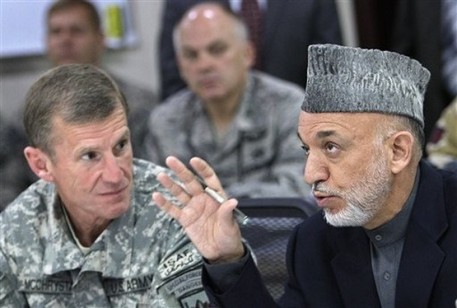
Responding to Sarah Palin's defense of Afghan President Hamid Karzai, Andrew Exum writes:
Oh, and by the way, if you think using leverage to affect the political choices made by the Afghan leadership is not a good thing right now, then you are a) Liz Cheney, b) Sarah Palin, c) a blithering idiot or d) some combination of the previous options.
Well, then I suppose I'll take "c) blithering idiot" for $1,000, Andrew.
However, keeping my blithering idiocy in mind, I wonder if Exum could perhaps clarify what he means by "using leverage." I don't think anyone - not even Governor Palin, for that matter - is arguing that Karzai should be exempt from any and all forms of diplomatic pressure. What she and other critics of the Obama administration's handling of Karzai seem to be taking exception to is the very public belittling of the man.
Larison suggests that Karzai's latter-day defenders are simply adding this to a continuum of mostly hollow attacks on Obama's foreign policy. I'm sympathetic to this argument, and he's probably right, but so what? Obviously, the president is going to make policy mistakes, and if your fallback position is to simply attack everything that he does, eventually, you're going to get one right! Blind squirrel ---> nut.
But if the United States is truly invested in securing and nurturing Afghanistan's fragile young democracy, what then is the point in publicly humiliating the democratically elected-ish leader of said investment? There's nothing wrong with pressuring Karzai behind closed doors; publicly equivocating when asked if Karzai is even a U.S. ally is another matter entirely.
If he is an ally, well then the answer should be simple. If he isn't, then what the hell are we doing in Afghanistan? As a critic of the Afghan surge, Karzai's legitimacy never really mattered as much to me as did eradicating al-Qaeda's presence in the region - and we're doing that. Exum, on the other hand, supports a prolonged military presence in Afghanistan, and yet, for some reason, also supports publicly undermining the democratically elected-ish leader of the country.
American legitimacy in Afghanistan is pegged to the legitimacy of Karzai and the Afghan government. Should it come as a surprise then when Karzai chooses to do photo ops with Ahmadinejad and, even more absurdly, threatens to join the Taliban after Washington publicly exposes him to be a contrivance or puppet of the West? Such marching orders place him in a rather untenable spot, no?
I don't know the answers to all of these questions, but I'm just a blithering idiot . . . or perhaps Liz Cheney. Is it too late to change my answer?
(AP Photo)
Daniel Drezner wonders:
Afghanistan, Iraq, and the economic downturn have caused a lot of Americans to (understandably) grow weary of sustained engagement in other parts of the globe. If the economy turns around, a lot of attitudes about foreign affairs might become less sour.Question(s) to readers: do you think the U.S. economy is primed for an supercharged recovery? If so, how will that affect attitudes towards American foreign policy?
I'd guess that at the elite level, certain kinds of criticisms of U.S. policy would be less persuasive in the context of a robust recovery (i.e. that the U.S. is over-extended). But overall, I'm not sure that GDP growth is the most salient factor when looking at American views of foreign policy. As Justin Logan has just highlighted, partisan affiliation seems to have a major, even decisive, impact.
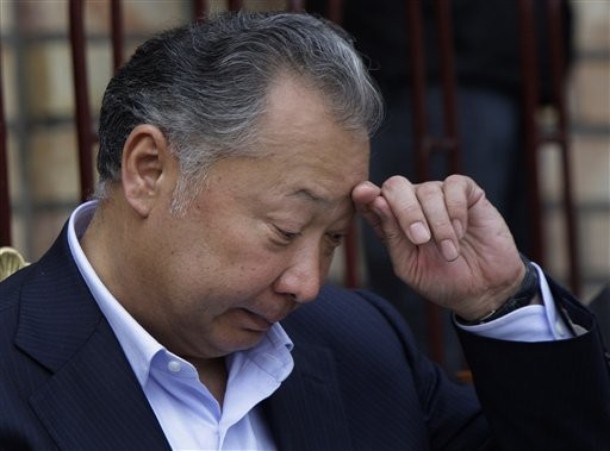
Philip Pan writes in the Washington Post that Russia played a role in fomenting the unrest in Kyrgyzstan by undermining Bakiyev through constant media attacks highlighting his corrupt rule:
The strategy was a sharp departure from Russia's traditional support for autocratic leaders in its neighborhood. It paid off quickly and dramatically, and it appears to have delivered the Kremlin a rare foreign policy victory.Not only has Moscow served notice on other wayward autocrats in its back yard -- many of whom also govern Russian-speaking populations that watch Russian television -- it also appears to have gained a greater say over the future of the U.S. air base here, which is critical to supplying the NATO military surge in Afghanistan.
(AP Photo)
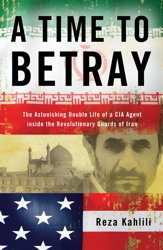 Reza Kahlili (a pseudonymous pen name) claims to have lived a double life. To his friends, family and colleagues in the Iranian Revolutionary Guards Corps, he was a regime loyalist working in the dutiful service of the Islamic Republic of Iran. But to the CIA, this young revolutionary was known as "Wally," and for over a decade this agency insider claims to have relayed sensitive information about Iran's most secretive military body to the U.S. intelligence community.
Reza Kahlili (a pseudonymous pen name) claims to have lived a double life. To his friends, family and colleagues in the Iranian Revolutionary Guards Corps, he was a regime loyalist working in the dutiful service of the Islamic Republic of Iran. But to the CIA, this young revolutionary was known as "Wally," and for over a decade this agency insider claims to have relayed sensitive information about Iran's most secretive military body to the U.S. intelligence community.
RCW recently spoke with Kahlili about his new book, A Time to Betray. This interview has been edited for length and clarity:
RealClearWorld: Why Did you join the Iranian Revolutionary Guard Corps (IRGC)?
Reza Kahlili: One of my close childhood friends had decided to join, and in the beginning, the Guards came from the poor sections of Iran. It was a tight fraternity; we even called each other "brother." It was built to secure the country, but it was also a way to build up the country's infrastructure and give back to the people.
RCW: You worked in the computer department, correct?
RK: Yes, it was late 1979, just a few months after the revolution, and I assisted in connecting bases around the country to assure communication and information throughout the corps.
RCW: Then, you became a spy for the U.S. Central Intelligence Agency. Why?
RK: The purpose of the revolution had changed. A radical minority was was now suppressing the majority. The Shah's officers - even those who surrendered willfully - were being executed, and plain-clothed Hezbollahi thugs were threatening people in the streets. Students were being tortured, and women were being raped in Evin prison.
RCW: And with this change the Guards also changed. The IRGC has been a hot topic since last year's election upheaval. What is the IRGC?
RK: There has been some misunderstanding about who is in charge in Iran, and many have falsely argued that the Revolutionary Guards are in charge; that Iran is really a military dictatorship. This is wrong. The IRGC will always be under the control of Iran's radical clerics. Its leaders can be, and have been, replaced. [Former IRGC chief commander Yahya Rahim] Safavi is just one example.
RCW: Who Are These "Radical Mullahs?"
RK: It all begins with Supreme Leader Khamenei, but you have other radical ayatollahs, such as [Ayatollah Mohammad Taghi Mesbah] Yazdi. He is an influential cleric in Qom, and also the spiritual adviser to Mahmoud Ahmadinejad. He helped Ahmadinejad get elected in last year's fraudulent presidential election.
Many of these clerics hold influential positions in government; especially in the intelligence units. Khamenei has representatives on every base and in every governmental department. The power structure begins with him.

RCW: So is the IRGC religious, secular or both?
RK: Most join the IRGC because they truly want to see the Islamic revolution spread around the world. But the organization's legitimacy, once again, begins with the clerics, so religion plays a huge role.
RCW: The Guards have also been compared to a corporation.
RK: Yes, what started as a small band of brothers became a security apparatus, a terrorist organization and then a ministry. Money was funneled to the IRGC, and it became heavily involved in black market commerce; buying and selling arms.
RCW: What do you think of President Obama's Iran policy?
RK: I had high hopes he'd study the attempts of previous administrations to negotiate with the Iranian regime. President Obama hoped he could put a new face on America abroad, and that would then bring Iran to the negotiating table. This was a misunderstanding, and a failure to learn from the efforts at negotiation made by his predecessors.
RCW: What about Obama's sanctions plan?
RK: Can you close the black market? Even during Reagan's embargo, NATO was selling items to Iran. The leadership doesn't care about the well being of the country, and sanctions will not faze them so long as they can get what they want on the black market. Sanctions are another illusion of the West.
The world must then understand the implications should Iran go nuclear. They will be untouchable. They'll move arms more freely, and they'll be able to threaten the world's energy markets. Mutual Assured Destruction (MAD) will not work on a suicidal state.
RCW: I'd like you to clarify that last point, because the activity you describe - moving arms, threatening energy outlets and acting with impunity - does not sound suicidal. What you describe is certainly troubling, but is it really suicidal?
RK: It is my opinion that they are suicidal. What if the Supreme Leader suddenly decided that the "Mahdi" was returning, and the end of days was near? It may all sound crazy to Westerners, but these people believe it deeply.
RCW: But Iran is believed to already possess chemical weapons. If they're indeed suicidal, why not use those?
RK: Can you wipe Israel off the map with chemical weapons? Can you kill millions? First impact is crucial, because no matter what Iran does, afterward, Iran will be no more. So in that case, would they rather fire ten missiles armed with chemical weapons to kill thousands, or fire nuclear-tipped missiles and shake the world?
RCW: So is containment out of the question?
RK: Iran doesn't hate the United State because of Iraq; it doesn't hate the United States because of Israel. They hate the United States because of the Qur'an. They believe Islam should conquer the world.
What would the consequences be for the world if Iran attacked the oil Gulf states, or Israel or Europe?
Why does a suicide bomber blow himself up? Answer that, and then tell me if containment will work.
*****
Kahlili claims his book first required approval from a U.S. intelligence body prior to publication. The opinions expressed in this interview are Kahlili's alone, and they do not necessarily reflect the editorial position of RealClearWorld.
UPDATE: David Ignatius reviews the book, and confirms that Mr. Kahlili had worked with the Central Intelligence Agency.
By Patrick Chovanec
The news that China ran a $7.2 billion trade deficit for the month of March (its first in six years) must strike people as surprising, given all they’ve heard about China running chronic trade surpluses. But you need to put it in context. China’s exports every year are highly seasonal — they peak in the fall, when Christmas orders are being shipped, and drop in the spring. So China’s trade surplus usually declines in the spring, and it’s not unprecedented for it to run a one-month deficit even in a year when it ends up running a sizeable trade surplus. The last deficit took place in April 2004, a year in which China went on to rack up a then-record $32 billion surplus.
What tipped this month’s figure from a marginal surplus to a deficit was a surge in imports, up 66% from last year. But it going to be important to drill down and take a closer look at exactly what’s making up those imports. If they are finished consumer goods, then it could be a sign of rising consumption in China and a shift towards more balanced trade. But if they consist mainly of raw materials, as many economists suspect, it could indicate that Chinese manufacturers are gearing up for a surge in exports later this year (a phenomenon compounded by rising commodity prices for inputs like iron ore and crude oil, in part due to rising Chinese demand).
The key question is, is this a trend or a cycle? Is it a trend towards higher domestic consumption and more balanced trade, or part of a production cycle that leads right back to where we started? I’m not convinced yet this is a trend.
There’s a lot of speculation that China may use news of this month’s trade deficit to fend off US pressure to strengthen the RMB, arguing that it is making progress in restructuring its economy and boosting domestic demand. But if this is part of a cycle, as many suspect, and China goes right back to running trade surpluses in a month or so, that argument’s not going to have much staying power. That’s probably why even Chen Deming, China’s Minister of Commerce (who has been very vocal these past few weeks about the damage a stronger RMB could do to exporters) is being careful not to overplay the news, describing the March trade deficit as “a blip on the radar screen” that may soon be reversed.
The key thing to watch, regarding China’s willingness to strengthen the RMB, is the recovery of China’s exports. They’re up just over 20% from last year, but that’s just barely back to the level they were at before the global financial crisis struck. With Chinese exporters already struggling, China’s leaders have been reluctant to hit them with a “double whammy” in the form of a less competitive currency. If exports continue their recovery, though, that will give the Chinese a lot more comfort in moving towards a more flexible exchange rate.
----
Patrick Chovanec is a professor at Tsinghua University's School of Economics and Management in Beijing, China. He blogs at http://chovanec.wordpress.com/
Matthew Yglesias takes a stab at defining one:
So my best cut at articulating the difference in a high-level way is that the right sees the world as zero-sum. Arrangements that advance the interests of others are inherently suspect because the mere fact that (say) the Russians think a deal is worth signing indicates that it must be bad for the United States. Progressives see a positive-sum world and believe in advancing American interests by means that including allowing others to advance their own interests. Progressives recognize the Hobbesian aspects of the international system that make positive-sum interactions difficult to obtain, but we see this as a challenge that can be overcome and seek means of overcoming it. Conservatives, meanwhile, are perpetually tempting fate—by sending the message to the world that America cares most about preserving its power relative to others, we indicate that the only way for others to advance their interests is by undermining our position.
First, I think Ygelsias is somewhat misrepresenting that dominant conservative position. I'd argue that conservatives seem to agree that some aspects of the world are indeed positive sum: the U.S. military as a global police force protects our interests but also lets allied states peacefully pursues theirs. They do not see the accumulation of U.S. power as a zero-sum affair because American power supports the positions and interests of a host of other nations.
While I'm skeptical of the idea of perpetual global hegemony, I'm not sure how much faith we can place in the progressive ideal sketched by Yglesias above. After all, what if other nations do view international affairs as a zero-sum conflict? We don't have the luxury of opting out of international competition just because we view the idea as anachronistic. It's one thing to take a magnanimous view of mutual interest when your country has the preponderance of power, but what if that changes?
Moreover there seems to be a glaring contradiction between a progressive foreign policy built around strengthening mutual interests and a progressive domestic policy that is deeply critical of international trade.
Jonah Goldberg has a few questions about America's coming European future:
Europe is a free-rider. It can only afford to be Europe because we can afford to be America.The most obvious and most cited illustration of this fact is national defense. Europe’s defense budgets have been miniscule because Europeans can count on Uncle Sam to protect them. Britain, which has the most credible military in NATO after ours, has funded its butter account with its gun account. As Mark Steyn recently noted in National Review, from 1951 to 1997 the share of British government expenditure devoted to defense fell from 24 percent to 7 percent, while the share spent on health and welfare increased from 22 percent to 53 percent. And that was before New Labour started rolling back Thatcherism. If America Europeanizes, who’s going to protect Europe? Who’s going to keep the sea lanes open? Who’s going to contain Iran — China? Okay, maybe. But then who’s going to contain China?
There are a few points to make about this. First, take the figures Steyn quotes - they're a bit out of context, aren't they? I mean, there was a fairly sizable strategic shift that occurred in the years from 1951 to 1997 that might have some explanatory power besides ravenous socialism.
Second, Europe's defense budgets are only minuscule compared to America - which, needless to say, is the wrong comparison. America is not only a European ally, it also spends nearly as much on defense as the entire world, combined. The better metric is to compare European defense spending to Russia (and throw in China too, for the fun of it) - and as you can see, they match up fairly well. Europe, collectively, accounts for a 20 percent share of defense spending, while Russia accounts for 5 percent and China 8 percent.
Now, you could argue that individual European defense budgets are low but if we assume that the Socialized America Goldberg fears spends what Britain or France do (about 2.5 percent of GDP) that's still a nicely funded, nuclear-armed, military.
So to answer Goldberg's first question: Europe can defend Europe. (It would also be nice to know what Europe needs to defend itself from that its current budget is somehow unable to cope with.)
The second question about sea lanes is a curious one because Europe polices sea lanes. Maybe Goldberg meant to imply that Europe doesn't defend enough sea-lanes to secure its trade and commercial interests. Or maybe he thinks they do a bad job?
As for who's going to contain China, why does Goldberg assume that an America with British-level defense spending wouldn't be up to the task? I mean, at the point that it becomes obvious that China needs to be contained, I'm assuming the U.S. military will prioritize accordingly and settling sectarian feuds in Baghdad and tribal spats in Kabul will take a back-seat.
And if China has to be contained, you would suspect that at a minimum the U.S. would find several Asian allies ready to contribute to that containment - including Japan, Australia, Taiwan, and, potentially, India and South Korea. Those are some wealthy countries with decently funded militaries and no small mount of suspicion regarding China's rise. So, to answer Goldberg's final question, even a "Europeanized" American defense budget, in conjunction with a concert of Asian powers, could contain China should the need arise.
Daniel Larison picks up on a curious criticism directed at President Obama's nuclear policy:
After having spent decades dismissing the possibility of deterring "rogue" regimes, Krauthammer and his colleagues cannot stop talking about deterrence all of a sudden, but they aren't willing to acknowledge that vast conventional military superiority is also a deterrent against attack.
Just so. We've spent the last nine years specifically listening to analysts and pundits mount attack after attack on the concept of deterrence. Back when America was safe and secure under President Bush's nuclear policy, the threat from Saddam Hussein was so urgent, the dictator so unpredictable and undeterrable, that only a war would suffice. Now the same people who had no faith in deterrence with respect to Iraq (and now, Iran) would have us believe that President Obama is nonetheless undermining America's deterrent capability.
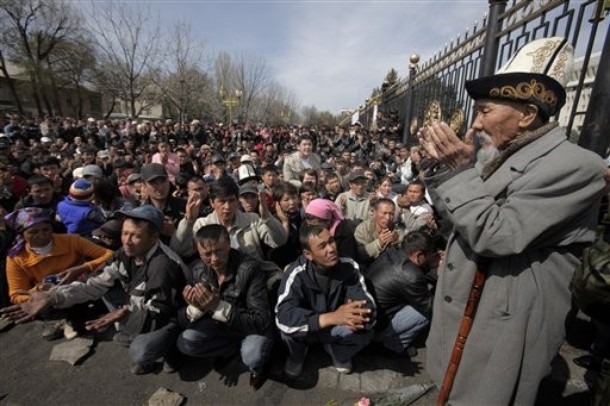
Golnaz Esfandiari notes that many Iranians are pondering the recent uprising in Kyrgyzstan, which saw the ancien regime run out of power in a mere two days. They're frustrated, she writes, by the Green Movement's lack of speedy progress.
Meanwhile, Sultan Sooud Al Qassemi examines why such uprisings don't occur against Arab autocracies:
The reason why Arabs are not more vocal about change in their countries varies from state to state. In the wealthy countries of the Gulf a sense of apathy can be felt that may be associated with materialism....
On the other hand are states that have largely been affected by former Egyptian leader Gamal Abdel Nasser's policies from financing coups to encouraging dissent including Egypt, Yemen, Syria, Libya, Tunisia, Algeria and until recently Iraq. In all cases corrupt leaders were replaced by equally corrupt leaders, so Arabs were back at square one.
In these less-wealthy states the opposition movements have floundered and have proven that they are either unable or unwilling to first and foremost instill good governance in themselves before they attempt to govern a state. The opposition movements' leaders have in most cases served in their positions for decades, appointed relatives to high ranks within the movement or demonstrated unrealistic expectations with regard to dealing with others – whether within the country or internationally – thereby leaving themselves largely without power or integrity.
On a ground level these states have perfected the notion of a police state. Rather unlike North Korea and China, they maintain the facade of democracy just enough to win praise or a blind eye from western leaders who are less inclined to host the opposition movements than they are the Dalai Lama, for instance.
Finally, Joseph Huff-Hannon finds a lesson for the United States:
But the unexpected swiftness with which an unpopular regime was swept aside, and the potentially seismic impact it has on the US war effort in Afghanistan – is a good reminder of the inevitable breaking point produced by a US foreign policy semantically dedicated to human rights – that looks the other way while "strategic allies" loot their countries' assets, murder their journalists, and send troops out to gun people down in the streets.In central Asia this groaning contradiction is louder than usual. While the war and occupation in Afghanistan was framed by President Obama recently as an effort at protecting "America's vital interests" in the region, there is at least periodic lip service paid to democracy enhancement and institution building in that country. But when democratic norms are trampled left and right in a neighbouring country, and the US looks the other way because it happens to be sitting on some prime real estate, we shouldn't be too surprised when things blow up and "strategic allies" fall before a storm of popular outrage.
While we shouldn't be surprised this happens, I'm still not convinced there's much we can do about it, at least in this specific instance. The Manas air base serves what appears to be a very important logistical function for operations in Afghanistan. Obviously, the U.S. military could work around the loss of the base, but it's not like Afghanistan's surrounded by liberal democracies dying to lend a hand - and given Afghanistan's land-locked position, such facilities are important.
I think this does underscore the necessity of dialing back the self-righteous rhetoric about freedom and democracy promotion that so often lures American politicians to heights of verbal excess. It's impossible to design foreign policy free of all contradictions and hypocrisy. But it is possible, one would hope, for our leaders to bit more mindful of highlighting those contradictions.
(AP Photo)
And the award for the most sober-minded, intellectually rigorous appraisal of President Obama's nuclear policy goes to Jeffrey Kuhner:
Iranian President Mahmoud Ahmadinejad publicly mocked Mr. Obama as an amateur. Iran is on the verge of acquiring the nuclear bomb. Like Adolf Hitler in the 1930s, Mr. Ahmadinejad rightly senses that the West's champion has lost the will to stand up to fascist dictators bent on military expansion. Mr. Obama's policies of appeasement - and threats of hollow sanctions - only elicit contempt from the Persian Nazi strongman...Mr. Obama's dream is a nightmare. Pax Americana has maintained global order since 1945. It is now crumbling, sapped by a crisis of confidence. The barbarians are at the gates. A new Dark Age is almost upon us. The American superpower is no more.
Runner up: Sarah Palin.
Second runner up: Tony Kinsella, who writes:
As the US Senate gears up to discuss the new treaty much will be written about different missile systems, verification arrangements and a host of other technical matters. All this will be of, at best, limited relevance.The more revolutionary challenge is one of humanity coming to terms with the novel reality that our 192 nation states no longer threaten each other militarily and that the era of inter-state wars is most probably behind us.
Um, sure.
Angus Reid surveys U.S. opinion on nuclear weapons:
In the online survey of a representative national sample of 1,005 American adults, 61 per cent of respondents would endorse a global agreement that would force all nuclear-armed countries to eliminate their arsenals.Only 22 per cent of Americans agree with the notion that nuclear weapons are “morally wrong” and the United States should get rid of its arsenal regardless of what other nations do.
Two-in-five respondents (43%) think that the U.S. is in a strategically sound position having nuclear arms and it is not in the country’s best interest to participate in international treaties that would reduce or eliminate its arsenal.
More than two-thirds of Americans would like the U.S. government to pursue the goal of either eliminating nuclear armament globally (36%) or reducing it considerably (35%). Only 12 per cent of respondents say the government should seek to maintain the current amount of nuclear weapons in the world, and a mere six per cent think the U.S. should develop new weapons.
Rasmussen Reports has its own numbers:
Fifty-five percent (55%) of U.S. voters oppose President Obama’s new policy prohibiting the use of nuclear weapons in response to chemical or biological attacks on the United States.A new Rasmussen Reports national telephone survey finds that just 25% of voters agree with the president’s decision to rule out a nuclear response if a non-nuclear country attacks America with chemical or biological weapons. Another 20% are undecided.
Only 31% favor a reduction in the number of nuclear weapons in the U.S. arsenal. Fifty-three percent (53%) oppose any such reduction. Sixteen percent (16%) are not sure.
The Taliban have released a video apparently showing the captured Bowe Bergdahl, an American soldier serving in Afghanistan.
For more videos on issues from around the world check out the Real Clear World videos page.
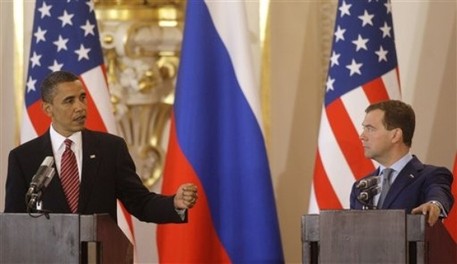
Dan McGroarty - a George H.W. Bush administration alum, and regular RCW contributor - analyzes President Obama's Nuclear Posture Review (NPR) and the New START treaty signed just today with Moscow:
In fact, the single largest line item in the 2011 Obama budget for the National Nuclear Security Administration is $2 billion for warhead modernization. The president's hairsplitting on whether a new warhead on an old missile makes it a new weapon is sure to demoralize the disarmament wing of his Democratic base - even as it invites a spirited discussion with Senate Republicans who stand between New START and its ratification.For the cynically inclined - a group that likely includes North Korea's Dear Leader and Iran's ruling mullahs - it all adds up to a kind of nuclear collusion between the old Cold War superpowers to reduce the carrying costs of so many warheads, while keeping options open to improve the warheads each retains, and reserving the right to add more under the strategic bomber loophole.
So is the new treaty counter-productive to the point that the U.S. Senate should refuse ratification? No. The Senate can sign off not because New START does so much so well, but because it attempts so little. For that very reason, don't expect the Bulletin of Atomic Scientists to turn back the doomsday clock - and don't expect New START to shame the rogues of the world into abandoning their nuclear dreams.[emphasis my own - KS]
Please be sure to read all of Dan's piece, and cling to its sobriety and thoughtfulness like your childhood blanket, dear readers. His point is an important one: in truth, the ardent nonproliferationist has just as much to be irked about today as the nuclear weapons proponent - if not more. Nuclear status quo wins the day. But you wouldn't know that judging by recent commentary from otherwise thoughtful analysts such as Max Boot and Victor Davis Hanson, who have taken the NPR and New START as an opportunity to grab the weaker America meme and run with it; substance be damned.
In truth, the updated NPR changes little, and has virtually no impact on the United States' ability to reciprocate WMD with WMD if attacked. It's mostly business as usual for U.S. foreign policy.
But that doesn't sit well with a number of people, especially the president's political rivals. With it being a mid-cycle election year, the Republican Party must come up with a viable message at the state and district levels in order to strengthen its hand in Congress for the duration of Obama's term. Their dilemma, however, is that President Obama has indeed done very little to change substantive policy abroad, thus forcing them to concoct a variety of rows and crises in order to raise Obama's negatives. The criticisms have rarely borne out, but they needn't have to, so long as the GOP can come up with clever slogans and biting one-liners about American decline for its TV spots and direct mail packages.
As Michael Goldfarb - a gentleman who's certainly familiar with the rotating Washington door of politics, policy and media - put it just this week:
The treaty is a give-away to Moscow, but it isn’t a total capitulation -- the cuts are marginal and the effect will largely be to continue the status quo, i.e. a decaying U.S. nuclear deterrent and rampant proliferation. We already knew that reversing those trends isn’t a top priority for the Obama administration (excepting Secretary of Defense Robert Gates, who seems to have put up a real fight on this one).Still, it’s an election year. How eager will Senate Republicans be to deliver their votes for a treaty that the administration will then turn around and hype as its signature (sole) foreign policy achievement?
Let the 2010 silly season begin.
(AP Photo)

Via Andrew Sullivan, Scott Harper reflects on the implications of the violence in Kyrgyzstan:
I asked Alex Cooley, a Columbia University professor who has studied the politics of the Manas air base, how he expected these developments to affect the relationship:
The United States has founded its engagement with the Kyrgyz government on providing lucrative contacts–for fuel and other Manas-related services–worth hundreds of millions of dollars to entities controlled by the Bakiyev ruling family. In the event that the government collapses, its successor will deem these contracts improper and will either terminate or renegotiate them. In fact, in the aftermath of the Tulip Revolution, then interim president Bakiyev publicly denounced the airbase deals that the United States had cut with the deposed Akayev family and demanded a huge increase in base-related rent. The larger lesson for the Defense Department should be clear: placating authoritarian regimes with private contracts and pay-offs does not guarantee long-term stability of relations; in volatile political climates like Kyrgyzstan, it may, in fact, sow the seeds for discontent and political challenges to the regime.But protestors also express anger at OSCE for providing military and police support, as seen in this footage posted by Reuters TV, in which a woman shakes her fist in anger at the heavy-handed techniques of the police, noting that OSCE has trained the police to repress the people.
The unrest in Kyrgyzstan is among other things a test for the short-term, and probably short-sighted, policies behind the U.S./NATO support arrangements in Kyrgyzstan. The United States has curried favor with powerful political figures intent on rent seeking. What happens when those figures buckle and fold in the face of public unrest? The U.S. proclivity for “sweet deals” with those in power will complicate things in time of transition.
To be fair to the U.S., it would be rather obnoxious to ask for a base agreement to support an urgent foreign policy priority only to tell the leaders of the host country that in addition to having the pleasure of assisting the United States they should reform themselves out of power and privilege. Seems like a hard sell.
But this does reinforce the problem of the scale of the effort in Afghanistan. I won't pretend to be intimately familiar with military logistics, but I'm assuming that the more troop-intensive the effort in Afghanistan is, the more important regional basing and resupply facilities become. And so the consequence of waging a large-scale counter-insurgency in Afghanistan (as opposed to the narrower, counter-terrorism war we're currently waging in Pakistan) is to put the U.S. in the awkward position of very publicly cutting unsavory deals with the likes of Kurmanbek Bakiyev.
(AP Photo)
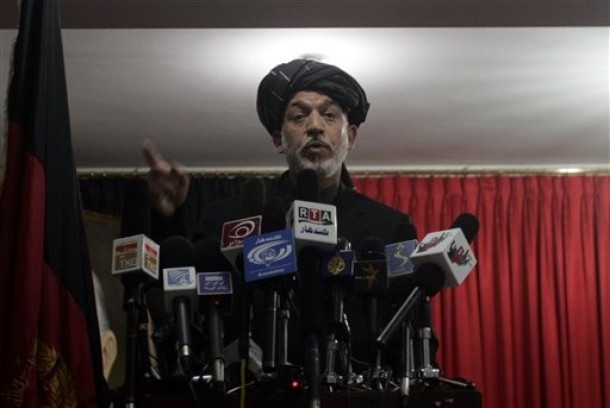
Wayne White offers his thoughts on Hamid Karzai:
What transpires in Kabul all too often is over-emphasized, with foreign actors frequently consumed by developments there that will have less bearing than one may think on what is happening throughout the countryside, where much that happens in Kabul is commonly little known or understood. More importantly, Karzai himself is falling into a related pattern of believing that the more he can control events affecting the ruling elite, the more he can guarantee ultimate triumph for himself in the overall equation. In fact, in doing so, he probably has damaged further his own ultimate prospects as well as those of the mission. This also was characteristic of Diem and Thieu.Unfortunately, I doubt there are ways of redefining the mission or shifting our concentration of effort that can reduce significantly the negative impact of corrosive political behavior on the part of Karzai, his many cronies, as well as other Afghan politicians raised in a similar milieu. Our inevitable association with him one way or another--and his dominance over the Kabul political scene--will continue to cast a shadow upon the overall US, Allied and Afghan government effort to create a situation in which a withdrawal is possible that would leave behind a stable, positive political order--perhaps regardless of the withdrawal timelines chosen.
I think the constant harping on Karzai underscores the problematic nature of conflating a narrow mission of beating back al Qaeda - which has largely been driven out of the country anyway - with creating a stable Afghanistan. The administration insists you can't have one without the other, but at what point does stability in Afghanistan cease to be worth the price?
And that's why I think we ultimately will have to either "redefine the mission" or declare mission accomplished in 2011, irrespective of the political stability in Kabul. At the end of the day, do we really want Afghanistan to have an open claim on American resources?
(In that vein, Michael Cohen argues that it's all the fault of the mythology of the Iraq surge. Counter-insurgency has been seen to be a huge success there and so it's simply been exported to Afghanistan, when in fact it may be the wrong strategy for that country - and may not have been as decisive as we think in Iraq, either).
(AP Photo)
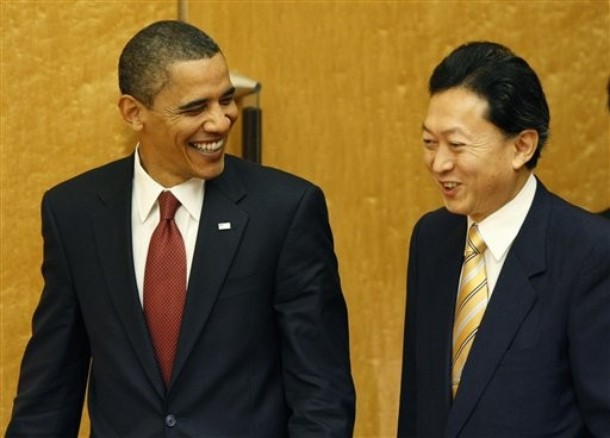
People in Japan continue to grow dissatisfied with the government led by prime minister Yukio Hatoyama, according to a poll by Nikkei. 57 per cent of respondents disapprove of Hatoyama’s cabinet, up eight points since February.
Michael Auslin had a good piece in the WSJ explaining why the Japanese might be tiring of the new government.
(AP Photo)
Phillip Blond is sometimes called the brains behind David Cameron's "Progressive Conservatism." In this speech, he outlines the historical and philosophical context for his theory of "Red Toryism." Fascinating stuff:
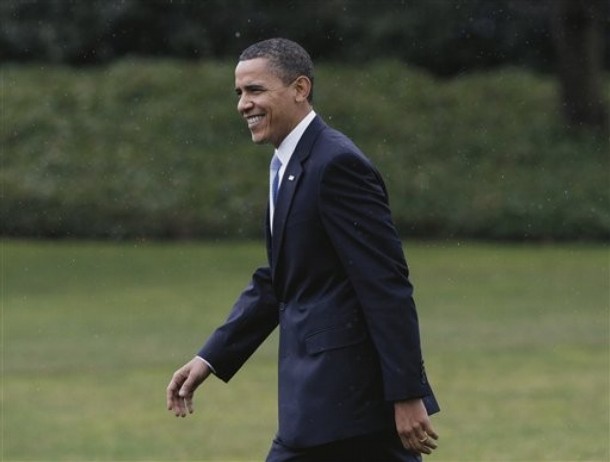
Up till now, I understood the conservative line on Iraq to be that we won. But Frank Gaffney argues that the recent violence in Iraq, coupled with the surge in Afghanistan, actually augur an American defeat in Iraq. And, naturally, it's Obama's fault:
An unmistakable vacuum of power is being created by Mr. Obama's determination to withdraw U.S. "combat" forces no matter what, starting with the cities a few months ago and in short order from the rest of the country.Increasingly, that vacuum is being filled by Iran and its proxies on the one hand and, on the other, insurgent Sunni forces, both those aligned with al Qaeda and those who have, at least until recently, been suppressing the AQI. On what might be called the third hand, Iraqi Kurds are experiencing their own internal problems as well as an increasingly ill-concealed inclination to assert their independence from the rest of the country.
Surprisingly, Gaffney writes the entire column with not a single reference to the Status of Forces Agreement signed by President Bush which required the U.S. to leave Iraq. Obviously, you could fault Obama for not trying to renege, subvert, ignore or renegotiate that agreement - but to not mention in the context of the current troop draw down in Iraq seems odd.
Although to be fair, Frank Gaffney is the font of many interesting ideas, including one, voiced recently, that the new logo of the Missile Defense Agency is actually an Islamic crescent that reflected the Obama administration's submission to Islam.
(AP Photo)
Daniel Larison reflects on the unrest in Kyrgyzstan:
These are the fruits of yet another “color revolution” that far too many Westerners enthused about out of misguided idealism, weird anti-Russian hang-ups or ideological fantasies of a global democratic revolution. Perhaps the most absurd expression of the enthusiasm for the so-called “Tulip Revolution” was a Chicago Tribune op-ed celebrating Akayev’s downfall and lauding John Paul II (no, really) as being somehow ultimately responsible, but there was virtual unanimity in the Western press that one more bad authoritarian was succumbing to the inevitable, glorious triumph of democracy. As it turned out, Akayev may have been the best Kyrgyzstan was going to be able to get, and ever since he was deposed Kyrgyzstan has been less stable, governed less well, and now joins Georgia, Pakistan and Uzbekistan as a new scene of violent repression of civilian protesters by a U.S.-allied government.
Ambinder nails it on the NPR critics:
The NPR's reliance on the Nuclear Nonproliferation Treaty is predicated on strengthening the NPT's penalties for non-compliant states. Number three, it is actively pressing China and Russia to support sanctions against Iran and hasn't ruled out imposing tougher sanctions with Europe alone (whatever that would accomplish.) Number four, "directly confronting" means -- what, exactly? War? Say it aloud, senators, if that's what you intend. [emphasis my own]
But they won't, and they probably won't have to. This is about raising the president's negatives and creating contrast; it's not at all about legitimate policy concerns. As the critics all but admit, they can't allow Obama to have a political victory abroad. Not during the mid-cycle silly season.
Radio Free Europe has put together a nice interactive map of Iraq's election results: you can sort by provinces, gender, party, parliament seats and turnout.
Matt Duss reports on the Foreign Policy Initiative's Iran: Prospects for Regime Change panel:
During the second panel of the day, which focused on U.S. policy options toward Iran, panelists Elliott Abrams, currently of the Council on Foreign Relations, and Danielle Pletka of the American Enterprise Institute both lamented the fact that the Obama administration seemed so disinclined to threaten — let alone take — preventive military action against Iran’s nuclear program. Abrams was particularly incensed that top military leaders like Defense Secretary Robert Gates and Joint Chiefs Chairman Adm. Mike Mullen have been downplaying the possibility of military action against Iran. “Israelis I speak to can’t believe how stupid the U.S. is to take a military strike off the table,” Abrams said.Left unmentioned, however, was the single most important factor acting to constrain U.S. policy options on Iran, specifically in regard to military force: Iraq. In numerous ways — stress on our military, regional destabilization and unrest, demonstration of the limits of U.S. power and influence, the need to shore up Iraq’s fragile government — the U.S. intervention in Iraq has made the idea of U.S. military action against Iran basically a non-starter for U.S. policymakers.
This is true, but I'd also suggest the Obama administration has foreclosed the option with a surge into Afghanistan and the elevation of nation building in that country as a key U.S. priority. If the U.S. took a blase attitude about political stability in Iraq and Afghanistan, it could pull back its troops and strike Iran with much less danger to U.S. forces and without much concern for the impact on Afghanistan or Iraq's political stability (not that I think a military strike would be prudent).
This news is pretty alarming:
An opposition member in Kyrgyzstan says a mob of angry protesters beat up the Central Asian nation's interior minister, who died shortly afterward.
The AP reports that protests are underway against the authoritarian rule of the country's President, Kurmanbek Bakiyev. Opposition leaders have reportedly been arrested and protesters have been killed. Kyrgyzstan is home to a U.S. military base currently supporting U.S. operations in Afghanistan. Eurasianet has more.
It's not clear what impact if any the protests will have on the U.S. position in the country. (Russia has a military base inside the country as well and they're reportedly standing pat and calling for calm on all sides.) Nor have any democracy promoters blasted the Obama administration for failing to support the Krygyz opposition in their struggle against tyranny. But it's early still.
Angus Reid has a not-so-surprising poll canvassing British economic anxieties as the election gets underway:
Many adults in Britain believe the country has not rebounded from the global financial crisis, according to a poll by Angus Reid Public Opinion. 83 percent of respondents rate the economic conditions in the United Kingdom as poor or very poor.Meanwhile, just 13% said the economy was in good or very good shape.
Zogby's latest interactive approval poll shows the public holds pretty negative views on the Obama administration's handling of foreign policy:
Foreign Policy: 43% positive vs. 55% negativeWar on Terrorism: 40% vs. 57%
Afghanistan: 38% vs. 61%
Iraq: 37% vs. 61%
Peter Galbraith (who is no disinterested observer) suggests rather casually that Afghan President Hamid Karzai is on drugs:
Visit msnbc.com for breaking news, world news, and news about the economy
Great!
Ben Simpfendorfer sees evidence that the Middle East is looking approvingly at the "China model" of development:
To be fair, China has fewer ethnic problems relative to the Middle East. Ninety-two percent of its population is Han Chinese. Its largest minority, the Zhuang Chinese, account for a little over one percent. That makes it easier to delay questions of political identity than it would be for either Iraq or Syria.Nonetheless, China illustrates that it is possible to leave the tough questions until later. I raised just this point at the Arab Thought Foundation’s conference noting that Taiwanese investors have built factories on the mainland not far from the Chinese missile silos pointing back at Taiwan.
It might that some countries are already learning. Syria, for instance, has pushed ahead with economic reform even if political reform remains stagnant. President Assad has talked of the “China Experiment”, and Syrian officials have made study trips to China to learn more about its success.
The Chinese are also bringing their pragmatism to the Middle East. Haixin, for instance, is an air-conditioning company that has recently built a factory near Cairo. I remain hopeful that others will follow, ignoring the region’s complex political problems that are more likely to deter Western companies.
It would be wrong to only praise China. Its pragmatism could equally be labeled mercantilism. As an Arab observer, based in China, recently wrote in Al Sharq Al Awsat, “a mentality of profit rules over Chinese officials”, and that for all China’s talk of increasing its imports from the Middle East, little has been achieved.
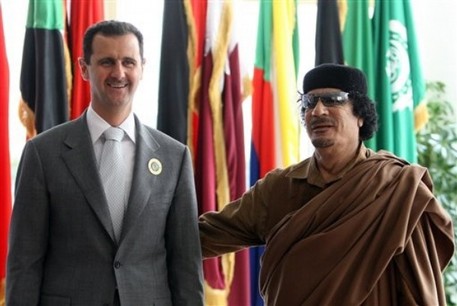
Michael Totten suggests that the West hit the brakes on embracing the Libyan president:
Libya, like Syria, is no longer ruled by one of the region’s “conservative” monarchies. Both are revolutionary regimes founded by leaders who came to power with ambitions beyond their own borders. Both are well-practiced in the art of using terrorism abroad as instruments of their foreign policies. Qaddafi formally renounced the practice to get back onto speaking terms with the West, but he and Assad together encouraged Palestinians to resume violent attacks against Israel just a few days ago. He hasn’t changed as much as he’d like us to think.
Totten also points us to an interesting Michael Moynihan dispatch from Libya.
(AP Photo)
I fear Andrew may have misunderstood my point on Iran-Iraq rapprochement. Perhaps Larison can clarify for me:
We could also draw another lesson from the growth of Iranian influence and power following the invasion of Iraq, and this is that policies that are supposed to increase and advance American power can be short-sighted and counterproductive. Indeed, these policies can ultimately produce the opposite result. More than that, we could conclude from this experience that the people most intent on securing and perpetuating U.S. hegemony are often the worst judges of how to do this.
Right, and as I argued yesterday, were Iranian influence in Iraq not marred by the ever-nebulous and changing concept of "American interests," we'd likely be cheering and gushing over such short order rapprochement between two bitter enemies.
And it should go without saying that there indeed are negative consequences for the United States should Iran exerts too much influence in Baghdad - especially if those interests are anything close to what we were told they'd be in 2003 and onward. Indeed, if keeping Iran isolated in its own neighborhood was imperative for American interests and security, then we basically acted in direct contradiction to that specific interest (there's a reason Iran rolled out the red carpet for the invasion of Afghanistan, after all).
And I believe the problem, as Larison notes, isn't just the policy, but the policymakers. The goalposts are constantly being moved on American interests in the Middle East, as wonks and writers jump from one bogeyman to the next. But this isn't strategy, it's just reaction; a bouncy ball of central front-ery.
At least yesterday, the bloodiest insurgency was not in Afghanistan, Pakistan, or Iraq, but in India:
The Naxalites have been around for a long time and it looks like they are still going strong. This hearkens back to the days not so long ago when insurgencies were generally looked at as domestic rather than foreign problems.
For more videos on issues from around the world, check out the RealClearWorld videos page.
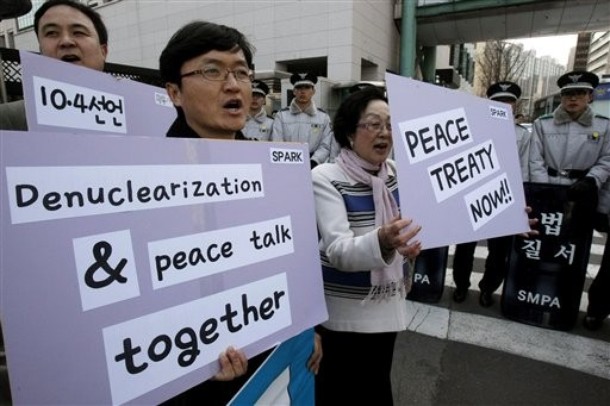
Jennifer Rubin has some questions about the Obama administration's nuclear posture review:
What possible rationale would there be for “revamping American nuclear strategy to substantially narrow the conditions under which the United States would use nuclear weapons, even in self-defense”? Why would we want to announce a new posture that ”eliminates much of the ambiguity that has deliberately existed in American nuclear policy since the opening days of the cold war”? [emphasis mine]
I'm going to take a wild guess and say that maybe it's because policy is 50 years old and the Cold War is over?
Rubin also writes:
It seems absurd to be “explicitly committing not to use nuclear weapons against nonnuclear states that are in compliance with the Nuclear Non-Proliferation Treaty, even if they attacked the United States with biological or chemical weapons or launched a crippling cyberattack.” All of this only reinforces the perception that Obama is dangerously obsessed with unilateral gestures and disarmament.
I do agree that unilateral American gestures are going to have zero impact on the nuclear designs of Iran and North Korea. That is the idea reportedly animating the administration's push for nuclear disarmament - we'll lead by example - and it's obviously very silly. But since we're never going to live in a world without nuclear weapons - and America will always have a nuclear arsenal sufficient to destroy every imaginable hostile nation we could face - I find much of the huffing and puffing about declaratory policy a bit tendentious.
Stephen Walt has more:
No matter what the U.S. government says about its nuclear strategy, no potential adversary can confidently assume that the U.S. would stick to its declared policy in the event of a crisis or war. If you were a world leader thinking about launching a major conventional attack on an important U.S. ally or interest, or contemplating the use of chemical or biological weapons in a situation where the United States was involved, would you conclude that it was safe to do so simply because Barack Obama said back in 2010 that the U.S. wasn't going to use nuclear weapons in that situation?Of course you wouldn't, because there is absolutely nothing to stop the United States from changing its mind. You'd worry that the United States might conclude that the interests at stake were worth issuing a nuclear threat, and maybe even using a nuclear weapon, and that it really didn't matter what anyone had said in a posture review or an interview with a few journalists. And you'd also have to worry that the situation might escalate in unpredictable or unintended ways -- what Thomas Schelling famously termed the "threat that leaves something to chance -- and thereby ruin your whole day.
(AP Photo)
I'm not sure why the National Review sought out a former mayor to offer feedback on American nuclear strategy, but here's part of the Rudy Giuliani's take:
“President Obama thinks we can all hold hands, sing songs, and have peace symbols,” Giuliani says. “North Korea and Iran are not singing along with the president. Knowing that, it just doesn’t make sense why we would reduce our nuclear arms when we face these threats.”
I wonder how many nuclear weapons Giuliani thinks we need to obliterate North Korea and Iran?
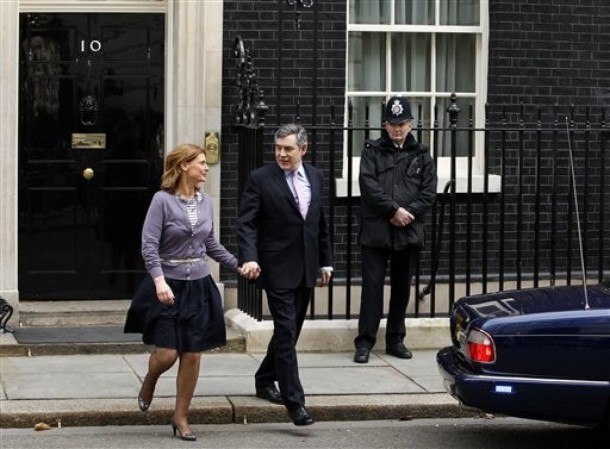
Gordon Brown's trip to the Queen to dissolve Parliament has kicked off Britain's general election season. We'll be following events closely here and on the home page. Be sure to check out the RCP British Election averages for the horse-race.
The BBC gives us the lay of the land:
To secure an overall majority, a party must win at least 326 seats. If no party succeeds in doing so, the result will be a hung Parliament.After 13 years in power, Labour enters the election with a notional majority of 48 seats, meaning that a loss of 24 seats would see them lose their overall majority.
Whatever the result, the make-up of the House of Commons will change significantly following the election, with 144 MPs so far having announced that they will stand down.
Parliament will not be officially dissolved until Monday 12 April - MPs will spend this week getting remaining legislation, that the parties can agree on, through Parliament - a process known as the "wash-up".
(AP Photo)

Writing in the Oil Drum, Chris Clugston makes the case that our supply of "non-renewable natural resources" (NNR) are increasingly scarce, posing a huge risk to the 1-billion plus people around the world living high on the industrial lifestyle. It sounds intuitive enough: there is only so much Earth and only so many extractable resources. The situation in the U.S. looks particularly grim:
A US NNR Scarcity Analysis was conducted to assess the incidence of NNR scarcity associated with fifty eight (58) NNRs in the United States.17 The salient findings:* Annual US production levels associated with 50 of the 58 analyzed NNRs have reached their geological US peak production levels;
* Twenty five (25) of the 58 analyzed NNRs are no longer being produced in the US at all;
* The US currently imports some quantity of 46 of the 58 analyzed NNRs; and
* For 18 of the 58 analyzed NNRs, the US imports 100% of its current annual utilization level.America has been able to supplement its continuously decreasing domestic NNR production levels—thereby forestalling fatal NNR supply shortfalls—by:
* Importing ever-increasing quantities of NNRs from foreign nations;
* Outsourcing US manufacturing operations to foreign offshore locations, thereby utilizing foreign NNRs; and
* Becoming a net importer of foreign goods and services, thereby utilizing foreign NNRs throughout the product/service production and provisioning processes.
Clugston also notes:
The salient findings associated with the assessment: 50 of the 57 analyzed NNRs (88%) experienced global scarcity during the 2000-2008 period; 23 of the 26 analyzed NNRs (88%) will likely experience permanent global supply shortfalls by the year 2030.At the end of the day, we are not about to “run out” of any NNR; we are about to run “critically short” of many. This reality will have a devastating impact on our industrial lifestyle paradigm.
If that is indeed the case, it would also put huge strains on our foreign policy, particularly with the one nation that's been aggressively shoring up its access to raw materials. But that's not to say everything is peachy in China either. Elizabeth Economy notes that China is enduring a major drought right now:
While China often confronts serious seasonal droughts—last year northern China experienced the worst winter drought in 50 years, costing the region 50 percent of its agricultural output—this year’s drought has hit even the typically water-rich southern provinces. According to one report, 600 rivers in southern China have simply dried up.
(AP Photo)
David Sanger and Peter Baker have the goods on the administration's nuclear posture review:
It eliminates much of the ambiguity that has deliberately existed in American nuclear policy since the opening days of the cold war. For the first time, the United States is explicitly committing not to use nuclear weapons against nonnuclear states that are in compliance with the Nuclear Nonproliferation Treaty, even if they attacked the United States with biological or chemical weapons or launched a crippling cyberattack.Those threats, Mr. Obama argued, could be deterred with “a series of graded options,” a combination of old and new conventional weapons. “I’m going to preserve all the tools that are necessary in order to make sure that the American people are safe and secure,” he said in the interview in the Oval Office.
White House officials said the new strategy would include the option of reconsidering the use of nuclear retaliation against a biological attack, if the development of such weapons reached a level that made the United States vulnerable to a devastating strike.
Mr. Obama’s new strategy is bound to be controversial, both among conservatives who have warned against diluting the United States’ most potent deterrent and among liberals who were hoping for a blanket statement that the country would never be the first to use nuclear weapons.
Mr. Obama argued for a slower course, saying, “We are going to want to make sure that we can continue to move towards less emphasis on nuclear weapons,” and, he added, to “make sure that our conventional weapons capability is an effective deterrent in all but the most extreme circumstances.”
Like the new START treaty, it's hard to see this having any effect on the nations we're most concerned about.
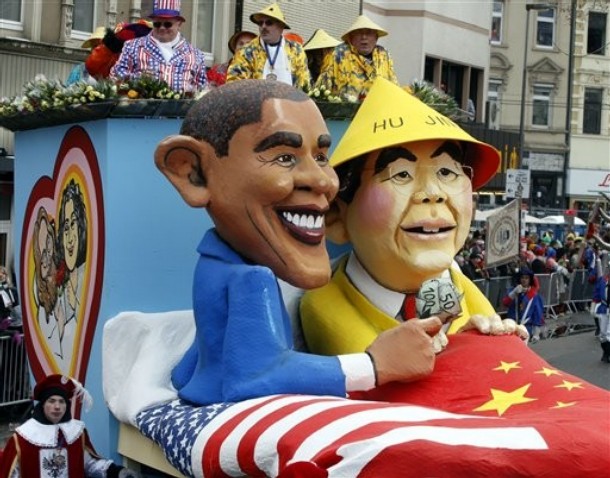
Reflecting on the watered down sanctions that will likely be issued by the United Nations over Iran's nuclear program, Will Marshall writes:
All this suggests we’re in for protracted haggling in the Security Council over language that, in the end, probably won’t induce the Islamic Republic to stop enriching uranium in defiance of UN strictures. The fundamental problem is not that China is indifferent to nuclear proliferation or intent on “protecting” a valuable trading partner. The fundamental problem is that China doesn’t seem ready yet to assume the responsibilities of global leadership, as we would define them.From Sudan to Iran, China puts the amoral pursuit of its own interests – in these cases, assuring access to the energy it needs to fuel its rapid growth – ahead of larger conceptions of international cooperation and order, or even its own undoubted interest in stemming nuclear proliferation. The idea of “enlightened self-interest” that underpins U.S. internationalism has an unnatural and vaguely sinister ring to officials in the Middle Kingdom. For now at least, it’s hard to imagine the historically self-contained and inward-looking Middle Kingdom spending trillions of renminbi, say, to support a Pacific analogue to NATO, or an architecture of international institutions dedicated to collective problem-solving. [Emphasis mine.]
I often wonder what American commentators would be saying if the shoe were on the other foot and the U.S. was the rising power and China the dominant one. Would we argue that, for all its faults, the Chinese-led international order was the best for America's interests and that, when America's commercial interests conflicted with Chinese priorities, the U.S. should subsume her interests to further China's agenda.
I suspect no American politician would touch that rhetorical framework with a hundred foot poll and yet we expect the Chinese to essentially swallow that line.
(AP Photo)
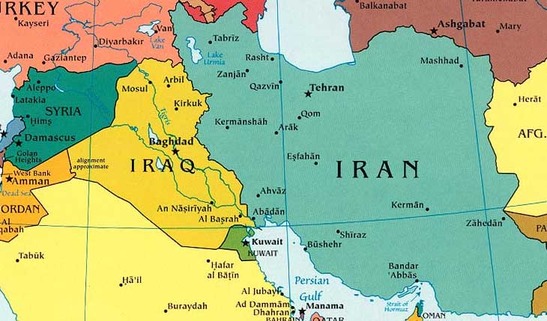
Addressing Iran's neighborly dalliances, Matthew Yglesias writes:
We were never going to be able to keep 100,000 soliders in Iraq forever. And by the same token, Iran can’t just leave the region and go be somewhere else. Some degree of Iranian influence is simply inevitable and always was.
Moreover, the fact that these two countries - both, just a quarter of a century ago, having been engaged in arguably the nastiest, bloodiest war in modern Mideast history - have come this far would normally be the stuff of historical praise; something akin to Europe's rise from warring rivals to peaceful partners. Their economic and religious ties have been well documented, and despite newly-elected Iraqi President and likely-PM-to-be Ayad Allawi's rhetoric, it's highly unlikely he'll do too much to shake the boat on Iraq-Iran relations.
This is why the horse race handicapping of which Shia factions are up or down in Iraq on any given day makes very little sense to me. One needn't know who the president of Iraq is, or whether or not "pro-Iran" political parties are influencing elections and government decisions, in order to measure Iranian influence inside Iraq. A globe or a good map should do the trick.
The problem with our thinking on Iranian influence in Iraq is we assume it to all be nefarious and cabal-esque, when in truth much of it is just geographic destiny. Iranian influence in Iraq is inevitable and - thanks in part to the United States - now expedited. There's no horse race to handicap in this case; that race was lost in 2003.
Iraq is indeed free now to choose its allies, and that's a good thing, right?
Last week I highlight a Michael Lind piece which argued as much. Philip Levy cites a study that argues just the opposite. Cato's Daniel Ikenson also dove into the issue:
Although the Chinese currency appears to be undervalued, the evidence suggests that appreciation will not reduce the bilateral trade deficit. Between July 2005 and July 2008 the renminbi rose 21% against the dollar, to $.1464 from $.1208, where it had been pegged since 1997. But the trade deficit, according to the trade statistics compiled by the U.S. Census Bureau, nevertheless increased to $268 billion from $202 billion over that period.Textbooks say that the Chinese should increase purchases of American products when the renminbi's value increases against the dollar — and indeed they did by $28.4 billion. But exports to China were already increasing rapidly before the currency began to appreciate, rising by $19 billion between 2002 and 2005, according to the Census Bureau.
Textbooks also predict that Americans will reduce their purchases of Chinese products in response to an appreciating renminbi. But U.S. imports from China between 2005 and 2008 actually increased by a whopping $94.3 billion, or 39%.
AEI's Michael Auslin had an article on Fox News arguing that Japan's unwillingness to host a marine base in Okinawa, Britain's skeptical take on the "special relationship" and the recently passed healthcare legislation spell trouble for global security:
The upshot of these three trends will likely be a series of decisions to slowly, but irrevocably reduce America's overseas global military presence and limit our capacity to uphold peace and intervene around the globe. And, as we hollow out our capabilities, China will be fielding ever more accurate anti-ship ballistic missiles, advanced fighter aircraft, and stealthy submarines; Russia will continue to expand its influence over its "near abroad" while modernizing its nuclear arsenal; and Iran will develop nuclear weapons, leading to an arms race or preemptive attacks in the Middle East.Under such conditions, global trade flows will be stressed, the free flow of capital will be constrained, and foreign governments will expand their regulatory and confiscatory powers against their domestic economies in order to fund their own military expansions.
For the past six decades, global stability was assured in large part by an expensive US commitment to maintain credible forces abroad, forge tight alliances with key strategic countries, and devote a significant, though not onerous, part of national treasure to sustaining a military second to none. Rarely in history has a country shouldered such burdens for so long, but the succeeding decades of growth and avoidance of systemic war proved the wisdom of the course.
Are these three strikes the writing on the wall, the blueprint for how American power will decline in the world, with a whimper and an empty purse? The choice to reverse these trends will grow increasingly difficult in coming years, until we reach a point of no return, as did Great Britain and Rome.
The result, unhappily, will not be a replay of the 20th century, when Washington stepped up after London's decline. It will almost certainly be the inauguration of decades, if not centuries, of global instability, increased conflict, and depressed economic growth and innovation. Such is the result of short-sighted policies that reflect political expedience, moral weakness, and a romantic belief in global fraternity.
It's one thing to worry if the U.S. was unilaterally unplugging itself from alliances over the objections of its partners, but at least in the cases Auslin cites, that's not the issue. The U.S. is harranging Japan to keep the base deal on track, while a democratically elected government, responding to the desire of its people, is objecting. In Britain, neither the current Labour government nor David Cameron's Tories are talking about seriously undermining strategic ties with the United States.
Auslin sites the success of a 60 year American strategy to keep the peace globally, but isn't this the fruits of such peace? Independent-yet-friendly democracies seeking a little more freedom of movement seems to me a far cry from countries seeking "non-aligned" status or worse, becoming clients of a competitive power.
Furthermore, I'm not sure why Auslin would suggest that "foreign governments will expand their regulatory and confiscatory powers against their domestic economies in order to fund their own military expansions." As Auslin notes, the U.S. is able to fund a globe-spanning military without undue burden, surely these other large economies can fund militaries sufficient to meet their (less grandiose) security needs.
I do agree with Auslin that we're looking at a potentially less stable international environment, but that's mostly due to the rise of China and more powerful states in Asia. And China is rising regardless of the percentage of GDP we allot to defense and entitlements. If defense analysts think this is going to overturn the peaceful workings of global trade, then it seems to me they should spend more of their time arguing against nation building in the hinterlands of land-locked Afghanistan than on health-care. The former pulls resources directly away from the mission of militarily containing China (unless providing security so that Chinese mining concerns in Afghanistan can reap billions in profit is a super-sophisticated form of stealth containment), while the later exterts a longer-term budget strain which may or may not impact defense outlays.
And while those who believe in "global fraternity" are surely romantics, I would argue that those who believe in a durable global hegemony are equally starry eyed.
Hindsight is a useful tool in foreign policy - it allows for the assessment of past events and trends in order to - hopefully - chart the correct future course for nations and states. This December 1958 article from Time Magazine analyzed China's "Great Leap Forward" policy and attempted to predict what Beijing's global position would be in the decades to come. Some items worth noting:
- China's population was projected to grow to a billion people by 1980, and to be at over 2 billion by the turn of the 21st century. That is actually close to the truth - China's one-child-per-family rule, instituted in 1980, resulted in approximately 400 million people not born over the past 30 years. In the absence of this policy, China's population today would be around 1.8 billion people.
- The article quotes British Socialist MP Richard Grossman writing that Chinese Communism is "far the biggest and far the most formidable mass movement in human history - a movement which 'within the next decade' may transfer the center of the world to Peking." The British politician may have been off considerably, but current events are shaping up much in Beijing's favor, as modern China already holds a formidable global power status.
- "As recently as World War II, Winston Churchill could impatiently dismiss as 'unrealistic' U.S. insistence that China have big-power status. Yet today, barely 15 years later, Red China is universally acknowledged as the most formidable military power in Asia. Within the Communist bloc, when China speaks, Khrushchev listens." Back In 1958, Soviet leadership was much more confident of Soviet Union's position vis-a-vis China, but few can deny today that when Hu Jintao speaks, both Medvedev and Putin are listening carefully. Even President Obama listens attentively to what his counterpart is saying in China. And Beijing''s growing military power pushes existing relationships and commitments across Asia to the limit.
- "What the Russians have to fear from Mao's China is not that it will desert to the West or 'pull a Tito,' but that it will one day seize leadership of the Communist world." Well, China does lead the Communist world - or what is left of it - but Beijing did better than "pulling a Tito" (a reference to a Yugoslavian economic and foreign policy that was largely independent of the USSR). Today, China is on track to become the second largest economy in the world, with current Russian economy far behind its vast Asian neighbor.
- "When Britain's Sam Watson forecast to Khrushchev that the Chinese would one day flood either north into Siberia or south into Australia, Khrushchev's reply was: "I'm all in favor of Australia." Today's Chinese economic expansion is utilizing Russia's eastern economic resources, and many in the Russian political and economic establishment are concerned that their country is becoming a raw material annex to Beijing, while many in Moscow worry that largely empty lands east of the Ural Mountains are slowly being colonized by the ever-increasing numbers of Chinese immigrants.

Charlie Rose had a fascinating interview with Michele Flournoy - the whole thing is worth watching in full but the talk about Pakistan was interesting. Rose noted the recent successes against the Taliban and the apparent turn in Pakistan towards cooperating more fully with the U.S. Flournoy chalked to it up to the U.S. successfully persuading Pakistan that the U.S. was in Af-Pak for the long haul.
This a theme her boss, Secretary Gates, has harped on frequently, citing his experience with Afghanistan in the 1980s. The thinking is simple enough: Pakistan will hedge its bets (i.e. support the Taliban) if it thinks the U.S. is going to bail on the region like it supposedly did after the Soviets withdrew from Afghanistan.
Flournoy noted that the administration had convinced Pakistan that even as the U.S. military role shifts and is ultimately reduced inside Afghanistan, it remains committed to the country for the long-term.
Which brings us to Mr. Hamid Karzai. On Thursday, Karzai unleashed a blistering tirade against the United States (he's later sought to clarify his remarks to his U.S. paymasters) but his little exegesis on U.S. imperialism is a good reminder that American commitments to stay "engaged" for the long haul are going to run up against Karzai and the local Afghan talent we're banking on to run the place.
None of this would be a problem if we were taking a very limited, cost-effective approach to keeping al Qaeda from reorganizing large-scale training camps in the country. But with tens of thousands of U.S. and NATO troops in the country committed to waging a "population-centric" counter-insurgency, we've set our sights a lot higher. That means Karzai and the quality of his governance is going to matter a lot more. And so far, it seems like that's going to be an increasingly serious problem for the administration's strategy.
(AP Photo)

The Economist has a long interview up with David Cameron. Toward the end, in touches on the recent debate in Britain about whether the "special relationship" with the U.S. is really all that special:
The Economist: The old alliance with America - what do you make of the notion that it’s over?David Cameron: I just don’t buy that. I think that, you know, one can get into sort of definitional problems. Is there a special relationship? Yes. Is it real, tangible - does it mean something? Yes. I think sometimes people, you know, you have to remember though we are the junior partner in that relationship and I think part of getting the relationship right is understanding how best to play the role of the junior partner. And I think there are times when leaders have done it very well and times when leaders haven’t done it so well. But does it still mean something? Yes, it does.
And I think you can see it in Afghanistan very clearly. I think, you know, on any number of issues you see Britain and America working very closely together, closer than with other allies, so I think it does still exist. I mean we don’t overstate it and don’t ever think that it’s a sort of equal partnership because it isn’t....
The Economist: Just to back up a little bit to the special relationship, did you experience any kind of disappointment or discomfort over the position that the Obama administration and Hillary Clinton took over the Falklands recently where they wanted us to negotiate with Argentina over the –
David Cameron: I thought it was disappointing, yes, but sometimes allies will not always agree. But I would want to make the point very strongly to them that if you believe in self-determination as a key part of the UN charter, then there’s the strongest possible case that the Falkland Islands should maintain under the sovereignty of Britain, because that is what the people who live there want. That’s what we went to war over.
In 1982, I was only three and a half – well, actually, I was 15, but I always thought it was just absolutely clear that there was just no justification for what Argentina was saying or doing and no justification to support it, because the population of the Falkland Islands want to be British. So I think it was disappointing, frankly, but I’ve always said the special relationship should be a frank and a candid one and I think you should frankly and candidly say we’re disappointed.
The Economist: There was a lot of fuss when Obama became President about how he has this grudge against the British because of our –
David Cameron: I don’t agree. I don’t believe it.
The Economist: You don’t believe it?
David Cameron: I think he bore a grudge because British Airways lost his luggage when he first went to Afghanistan.
The Economist: But it seemed to be with no justification that he removed the bust of Churchill from the Oval Office. That all seemed to me to be a bit overdone, but one does look at this, as you say, key part of our national interest and we are the second-biggest contributor to the forces in Afghanistan, as we were in Iraq and one does wonder if over this black and white issue, as you see it, they take a different view, actually what is this relationship worth?
David Cameron: Well, go back to the Falklands War and you can remember how much it was worth, because the Americans gave us a huge amount of help in terms of military and logistics and all the rest of it. So at the key moments I would always say that the relationship has proven to us. It did during the great Atlantic alliance; it has over NATO; it did over the Cold War; it did over the Falklands. Have there been ups and downs? Yes. Grenada, Charles Powell tells me the story that Reagan was holding the phone out here because Thatcher was shouting so much. The relationship will have its ups and downs. Clearly, America has a very strong interest in maintaining very friendly and strong relations with all the countries in South America and so there’s a clash, there’s a grinding of wheels there, but we just need to be clear to our best and oldest friend how strongly we feel about this.
Cameron seems to have a measured take on this tempest in a teapot. Unlike some people.
(AP Photo)
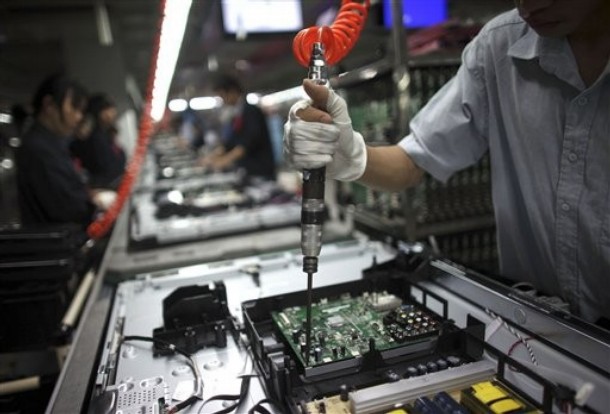
Michael Lind had an interesting article in Salon earlier in the week arguing that America's Cold War strategy of "markets for bases" has hollowed out the U.S. economy:
During and after the Korean War, the U.S. rebuilt its military and stationed troops along "tripwires" from Central Europe to East Asia. The U.S. encouraged the formation of the European Common Market (now the European Union) in part to provide the West Germans with markets. In Asia, Mao Zedong's victory in China cut off Japan's China market, so the U.S. offered the American market to Japanese exporters, which initially were not considered a threat to American businesses.Thus began the Grand Bargain at the heart of U.S. Cold War strategy toward West Germany and Japan, the "markets-for-bases" swap. In return for giving up an independent foreign policy to their protector, the United States, the West Germans and Japanese would be granted access to American markets (and, in the case of the Germans, access to Western European markets)....
A version of the markets-for-bases deal was extended to China, which, it was hoped, would acquiesce in U.S. military hegemony in its own neighborhood, in return for unlimited access to American consumers.
George W. Bush made the deal explicit in his 2002 West Point address: "America has, and intends to keep, military strengths beyond challenge -- thereby making the destabilizing arms races of other eras pointless and limiting rivalries to trade other pursuits of peace." U.S. to other great powers: We make wars, you make cars.
I don't think we should short-change the success in turning Japan and Germany into very prosperous, friendly nations. The U.S. not only helped them rev up their shattered economic engines, but directed their economic output toward peaceful goods. In contrast to the first World War, the U.S. and allied strategy was a lot more far-sighted, even if it has now run aground.
The current Washington consensus is that a similar gambit will work with China - they grow rich from American consumers and thus become "stake holders" in a system of our design, subordinate to our geopolitical priorities. Lind doesn't think it will work. I'm on the fence.
I think it's obvious that the military aspect of this strategy - we build a huge conventional force and you spend your money on consumer goods - is not applicable to China. But where are the other incentives to keep China more or less in harmony with American objectives?
Fundamentally the gambit with Germany and Japan worked because we had to keep them "on side" during the Cold War. There's no such dynamic at work today. China has every incentive (for now) to keep taking advantage of U.S. markets without playing ball when it comes to U.S. strategic priorities. It remains to be seen whether the reported "thaw" in U.S.-China relations is significant or not. Gideon Rachman, for one, thinks its all for show - a way for China to escape the charge of currency manipulation.
Either way, is the U.S. - deeply in debt (to China!), overseeing two wars, groping around the world for a handful of jihadists, trying to stave off a nuclear Iran and bring peace to the Holy Land (and Kashmir) - well poised to throw them a brush back pitch?
(AP Photo)
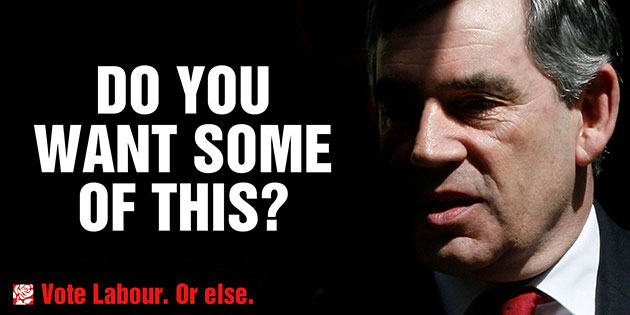
On, ahem, April 1, the Guardian has learned of a new campaign strategy by Labour to portray Gordon Brown as a tough guy:
One tactic being discussed involves provoking a physical confrontation at one of the three ground-breaking TV debates between the candidates. In this scenario, Brown, instead of responding to a point made by Cameron, would walk over from his microphone with an exaggerated silent display of self-control, bring his face to within an inch of the Tory leader's, and in a subdued voice, ask "what did you just say?", before delivering a single well-aimed blow to his opponent's face, followed by a headlock if required.The bloodied and bruised Cameron could then be whisked to a nearby hospital, where a previously briefed team of doctors and nurses would demonstrate the efficiency and compassion of the NHS under a Labour government.
One of the subtexts of the Obama administration's decision yesterday to open up parts of U.S. coastal waters to oil and gas exploration is the idea that greater American energy production will deliver us to the nirvana of energy independence. This idea is, of course, bunk. Yet energy independence is a bi-partisan fixation. Conservatives have their drills, liberals, their windmills. But as Daniel McGroarty wrote in these virtual pages earlier in the week, a green energy revolution would leave the United States heavily dependent on China:
The wind turbines, solar panels and next-gen batteries that are at the core of the Green Energy movement. And there's a devilish dynamic at work: The more one set of researchers strives to decrease the amount of rare earths we need for a given function - the more another bunch thinks up new inventions that become viable with smaller traces of rare earths. Multiply those new uses across tens and hundreds of millions of cell phones, PDAs and whatever new device is destined to come off the drawing boards, and you get the picture. The world is going to need a lot more rare earth compounds than we're producing right now.Where will we get them?
Today, 95 percent of all rare earths produced worldwide come from a single country: China.
In short, the idea that America is going to find defense in self-sufficiency is alluring but false. Even the Hermit Kingdom needs support from the outside world.
Alex Alexiev writes in National Review about the wave of Russian terror:
As clear-cut a case of Islamist barbarism as it is, though, it is difficult to make sense of the spiraling violence in Russia without reference to Vladimir Putin’s disastrous anti-terrorism policies.Unlike his predecessor, Boris Yeltsin, President Putin from the very beginning of his tenure in the Kremlin showed himself completely unwilling to consider any negotiated settlement with the Chechens and pursued a strictly military solution and a puppet regime in Grozny instead -- an attitude characterized by his vulgar promise to the resistance to “rub them out in the latrine.” He had no interest in exploring let alone exploiting the deep gulf between the resistance’s hard-line, Saudi-supported Islamists and its secular nationalists, who had little in common except their vehement dislike of Moscow’s heavy-handed domination.
Could it be that National Review has succumbed to Papism? Or is realism only useful when it can be used to criticize Russia?
One more for the Lady Gaga files (not that we're obsessed or anything). Thomas Hegghammer writes:
Qutb was indeed disgusted by aspects of American culture, but he neither waged nor advocated violence against the United States. Qutb's jihad was against the Egyptian regime, not America.To the extent that Westernization causes militancy, the violence it inspires is nearly always directed at other Muslims, typically against regimes in Arab countries, because these legislate over matters of public morality. Jihadists are idealists, but they are not so utopian as to think they can stop Westernization by attacking America. However, they do think that by installing Islamist local governments, those governments can take measures to limit social liberalization.
Militants who attack the West, such as al Qaeda members, represent a different phenomenon. They argue that the fight against secular Muslim regimes (and by extension Westernization) is less urgent than attacking non-Muslims who kill Muslims and occupy Muslim territory.